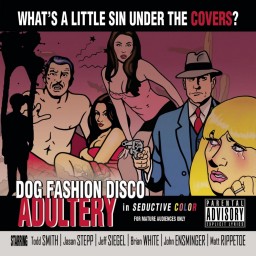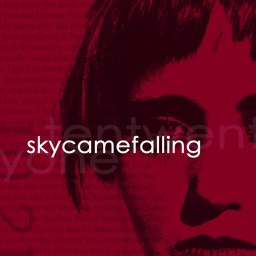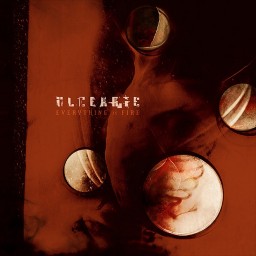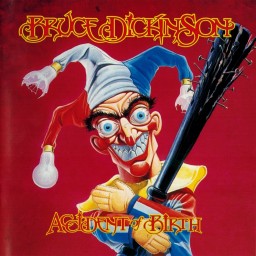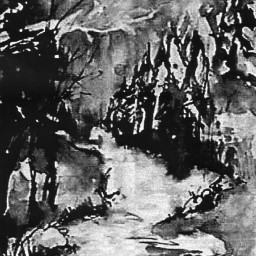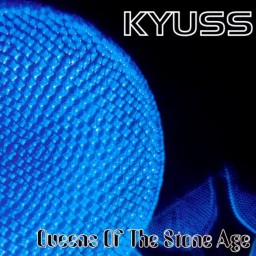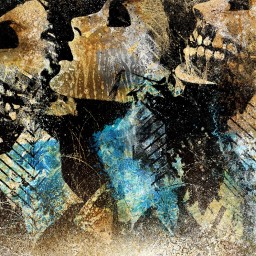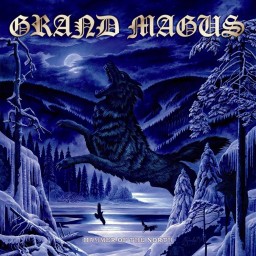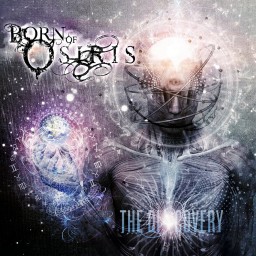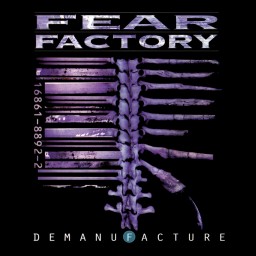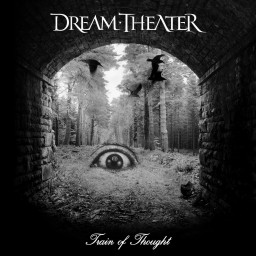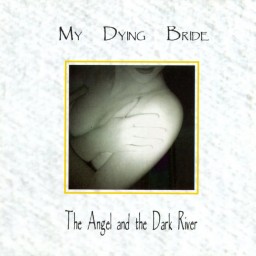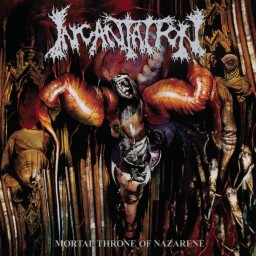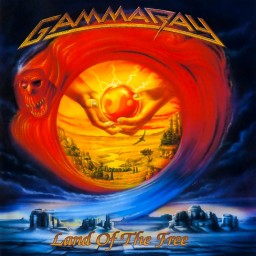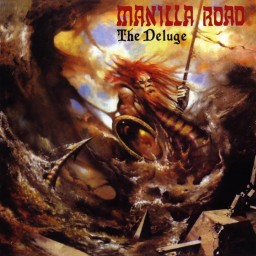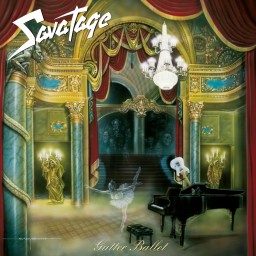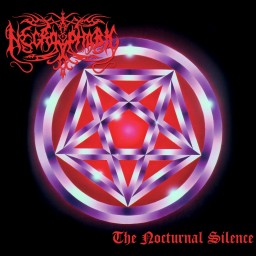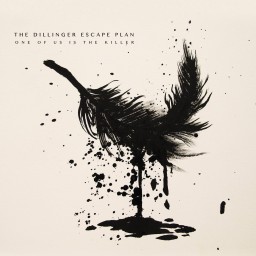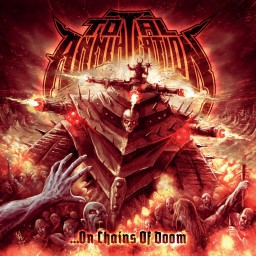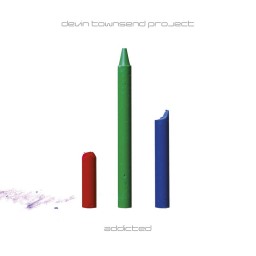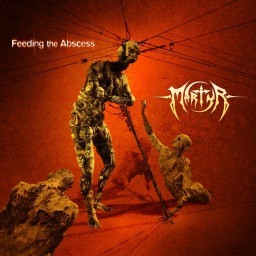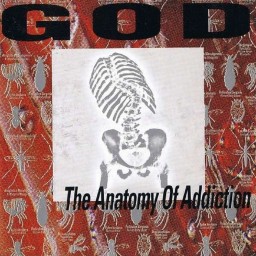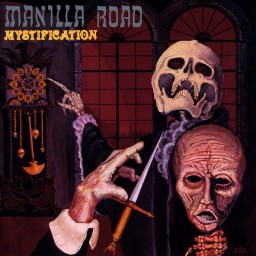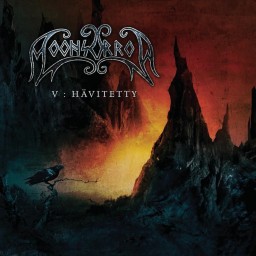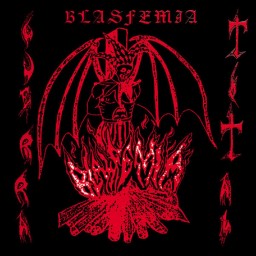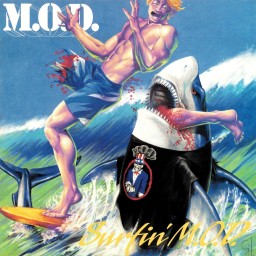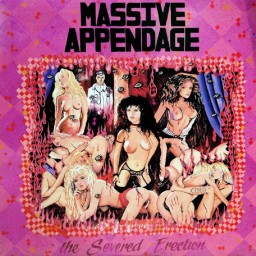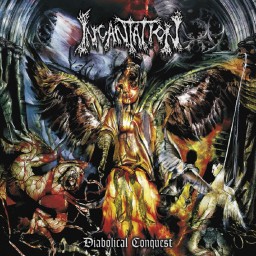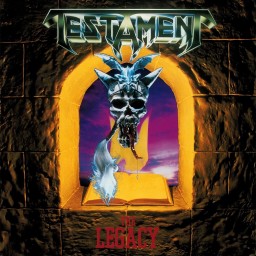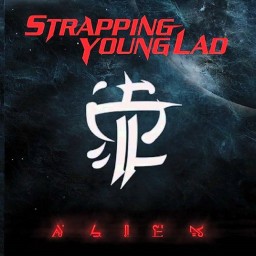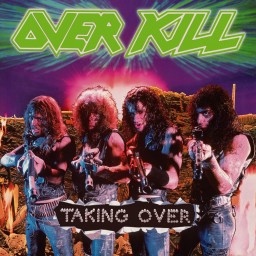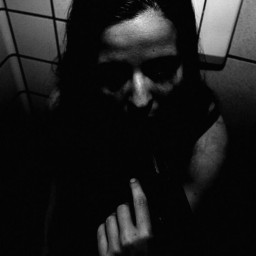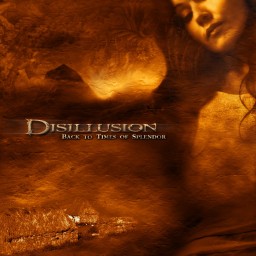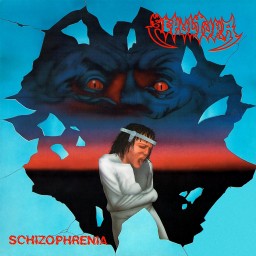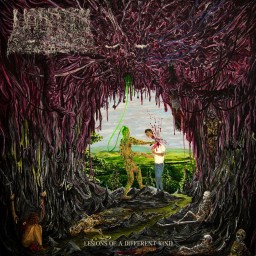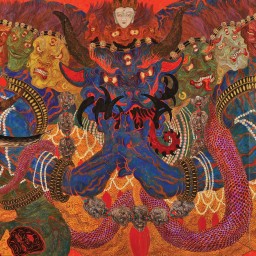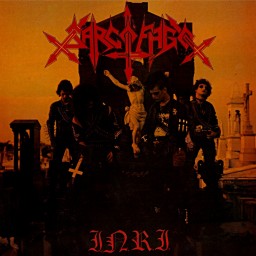Daniel's Reviews
Maryland-based avant-garde alternative metal outfit Dog Fashion Disco have been around for over 25 years now & I’ve seen their name floating about quite often in that time, usually in connection with their 2006 sixth album “Adultery” which seems to be regarded as their career highlight by a fair margin. The comparisons with Mike Patton & (in particular) Mr. Bungle have always intrigued me as Ben & I spent many an hilarious evening laughing our asses off to Bungle’s 1991 self-titled debut as teenagers in the early 1990’s. They certainly weren’t traversing an artistic space that I would usually have been interested in but god damn if they weren’t as fun as fuck & the same can be said for Dog Fashion Disco if this record is anything to go by.
Now let’s deal with the elephant in the room right from the get-go, shall we? Dog Fashion Disco really love Mr. Bungle & aren’t afraid to show it. In fact, “Adultery” is pretty much a variation on a theme that Patton & co. had already well & truly defined. However, it also has to be said that that statement isn’t something you hear all that often & there aren’t all that many alternatives for diehard Bungle fans in all honesty, particularly ones that are written, performed & executed as well as this one is. The film noir template they’ve based their themes around works beautifully & ensures that the listener is constantly being treated to new scenes & stylistic u-turns while always maintaining a wonderfully fresh energy & an uncanny understanding of a whole plethora of disparate genres.
Front man & band leader Todd Smith sounds a lot like Mike Patton most of the time. In fact, you could say that he’s a dead ringer for him but that doesn’t take away from the clear talent he has for a charismatic delivery of a whole bunch of different tones & techniques. There are a few jarring transitions here & there but they make perfect sense from a thematic point of view which sees you making excuses for them a lot of the time. I definitely enjoy the heavy alternative style guitar parts a lot & think that Dog Fashion Disco are at their best when they’re at their opposite extremes i.e. the chunkier & more up-tempo alternative metal material with the catchy vocal hooks & the much deeper film noir-driven ambience that sees me taking a swift chill pill or two.
The musicianship, song-writing & execution are all top notch & there are plenty of sections that leave me gasping at the sheer ambition on display. The consistency in the song-writing is also outstanding with only the country number “Desert Grave’ failing to engage me which is mainly due to my overarching issues with country music in general. The rest of the album ranges from pretty decent to very solid to absolutely mind-blowing with the peak of the album residing in the sexy stripped back lounge feel of “Private Eye” leading into the total banger that is “The Darkest Days” (i.e. the clear high point of the record for me personally). The themes are certainly intended to be in foreground but don't think that it's essential to follow them in order to enjoy the album. Lyrical content has never been something I've focused on terribly much & after giving this record a few spins I still have no idea what the storyline is about but it really doesn't matter all that much in the grand scheme of things because the music is of a high enough quality to easily stand on its own two feet.
Whether you’re a diehard member of The Gateway clan, a casual fan of alternative metal or simply a curious passer-by, “Adultery” comes thoroughly recommended from this jaded ol’ metalhead. If you ever feel that you need a time-out from the norm & are looking for a temporary escape to a dark & wonderful place filled with mystery & intrigue then Dog Fashion Disco may just have provided you with the perfect outlet.
For fans of Mr. Bungle, Stolen Babies & Polkadot Cadaver.
Genres: Alternative Metal Avant-Garde Metal
Format: Album
Year: 2006
I didn’t have any prior experience with New York metalcore outfit Skycamefalling coming into this month’s feature release submission but have seen their 2000 debut album receiving consistently high praise from critics & fans over many years now so have been meaning to investigate it at some point. “10.21” is a lengthy undertaking clocking in at just over 63 minutes in duration however it never feels arduous & that run time is slightly extended by one of those needless four & a half minute periods of silence at the end of the tracklisting which only ends up resulting in a one-minute fading reprise of the closing number.
Skycamefalling’s sound is extremely well defined for a band that was only conducting their very first full-length recording effort & they’ve achieved a beautiful balance of consistency & creativity here to tell you the truth. They represent something much more than your generic metalcore fodder, despite the vocals of Christopher Tzompanakis sitting very much within the confines of the subgenre specifications. Christopher’s gravel-throated screams remind me quite a bit of Converge front man Jacob Bannon actually however the instrumentation is just as likely to draw from external influences as that of Jacob’s band. Unlike some of Converge’s more highly celebrated material though, “10.21” doesn’t offer the most imposing, urgent or extreme variety of metalcore you’re ever likely to hear. In fact, it’s pretty unintimidating is many respects & has chosen a very different tool set with which to slice its prey.
The production job of Jim Winters is a real highlight & on first listen you’d be forgiven for thinking that this album had only just hit the shelves last week. The guitar & bass tones are both warm & thick & maintain a suitable amount of heaviness without ever really feeling particularly metal. Sleepcamefalling actually sit much closer to the hardcore punk side of the metalcore equation than the metal one & that tone is well suited to the hardcore environment. Some of the riffs have a clear alternative rock edge to them too which is further complimented by the guitar tone & this results in even the more rocky & generic & sections presenting themselves in a lively & enthusiastic way.
As strong as the heavier tracks may be though, the most entertaining element of Skycamefalling’s sound is their use of post-hardcore experimentation with the majority of my album highlights aligning themselves with the band’s more ambitious undertakings & casting aside the heavy guitars & screamed vocals altogether. The opening intro piece is a great example as it sounds uncannily like something that Radiohead might have done. I always find myself waiting (even begging) for Thom Yorke’s nasal vocals to slither their way out of my speakers & into my eager ear cavities & it’s almost disappointing when one of the better heavy tracks “With Paper Wings” finally savages your expectations at its completion. Then you’ve got a lovely two-minute clean guitar driven post-rock instrumental that breaks things up nicely a few tracks into the album & the wonderfully epic ten-minute title track with its relaxed tribal rhythm & slowly building acoustic guitar work. You’ll rarely find a better example of the post-hardcore sound & it’s these elements along with the undeniable consistency of the tracklsting that sees my score sitting at such an impressive level.
Overall, “10.21” is fairly easy on the ears for a metalcore record. There are relatively few signs of the abrasive approach that the majority of their contemporaries pride themselves on however there’s simply not a requirement for it here as Skycamefalling have a much broader palate of influences to draw upon & have an acute understanding of the tools at their disposal & the dynamics required to keep the listener genuinely engaged. Throw in a tracklisting that’s completely free of blemishes & you get yourself a damn entertaining metalcore record that won’t disappoint its target audience.
For fans of Converge, Norma Jean & Cave In.
Genres: Metalcore
Format: Album
Year: 2000
When I finally returned to the metal scene back in 2009 after a decade immersing myself in electronic music, I was very keen to see what my beloved death metal genre had evolved into. The late 90’s had seen my interest gradually starting to wane as death metal’s reign at the top of the extreme metal bubble had gradually started to burst however this hadn’t eroded my passion for the classics in the slightest so my curiosity was still high & I progressed into a period of frantic binging. Amongst the litter of pretenders & copy-cats, I stumbled upon the brand new sophomore album from New Zealand three-piece Ulcerate & was fascinated as to how a band from such a small & relatively local country had seemingly created such a buzz in the underground scene so I went into my first listen with an open mind & few expectations.
The first listen of a record like “Everything Is Fire” can be very challenging, even for the most hardened death metal fanatic. It’s an extremely inaccessible release & requires a level of patience to fully grasp. The first thing that hits you is the sheer density of the sound you’re presented with & it’s hard to believe the sonic assault you’re experiencing has come for just the three dudes. In fact, I’d be very surprised if most fans didn’t find their first run through the album to simply wash over them with very little actually sticking as the listener struggles to find something familiar to grab on to & that was very much the case with me. It was only on subsequent listens that the individual tracks started to open up & I began to realise why I’d struggled so much with it on first listen.
You see, “Everything Is Fire” is an extremely complex record. The level of technical skill required to create this music is astonishing. In fact, it’s so ambitious from a compositional & structural point of view that it often becomes its own worst enemy with its weakest moments proving to simply have too much going on for the listener’s brain to take it all in. It’s almost like the band members had too many ideas & tried to stuff them all into the shortest possible period of time. On some occasions this can come across as sheer genius while at others it becomes overpowering & sees the whole structure of the song-writing starting to break down. Thankfully though, the atmosphere that’s created has a darkness & a vitality that ooze of an elite class artist & this was enough to see me holding the album in high regard & placing it on high rotation for several weeks as I valiantly attempted to understand what was being presented to me.
As I would later discover, Ulcerate had begun life as a fairly generic technical/brutal death metal band & despite finding their 2004 “The Coming Of Genocide” demo to be much closer to my musical roots, I also found it to be pretty boring overall. Things would start to take shape with their 2007 debut album “Of Fracture & Failure” which kept me engaged with a little more ambition thrown into their sound however the stop/start nature of the song-structures made it sound a touch messy so it didn’t hold all that much replay value for me. Things would change drastically in the two years that followed though as “Everything Is Fire” is a very different beast & is very much the release that represents Ulcerate's coming of age. This time the band had harnessed the dissonant & chaotic brand of tech death that Canadian legends Gorguts had created earlier in the 2000’s but had combined it with the dark atmosphere of Immolation & some wonderfully engaging post-sludge influences that sound similar to Neurosis. So it’s essentially a concoction of a few of my very favourite sounds, all thrown into a blender & presented in a classy & refreshing way. That’s not to say that it’s all a resounding success though as the tendency to descend into overly complex muck is still occasionally at play here however every track has enough musical genius to comfortably transcend those obstacles.
It’s worth mentioning that the highlight of any Ulcerate record is most certainly drummer Jamie Saint Merat & “Everything Is Fire” is no exception in that regard, despite him surpassing even these obscene levels of proficiency on subsequent releases Jamie's quite simply the most astoundingly talented drummer that I’ve ever witnessed in metal music & that includes all of the big names. In fact, when I saw Ulcerate live I found that I could happily have stood & stared at him playing completely solo for hours on end, such was the impression his incredible technique left on me. On this occasion, the clicky kick drum sound doesn’t do him any favours as it tends to highlight even the slightest blemish in a lightning-fast double kick run & that’s certainly not evident on subsequent releases however the sheer power & precision on display is mind-blowing. It’s really pretty easy to let Jamie’s performance overshadow the rest of the band but once you get comfortable with that element you’ll notice that the angular & twisting guitar work of Michael Hoggard is quite spectacular too & is further accentuated by an excellent tone that highlights every nuance whilst losing none of its menace. The use of more atmospheric post-metal sections is a master stroke &, despite all of the dazzling technical histrionics, I tend to find myself enjoying these parts as much as anything else on the album. In fact, it’s the two extreme ends of the Ulcerate sound that give me the most pleasure i.e. the sludgy, downtempo & wonderfully professional post-metal excursions & the more straight forward blasting parts. When they stick to those two extremes I find that everything comes together more consistently than it does when they’re trying to set new records for the amount of riffs they can cram into a few bars. Bassist Paul Kelland’s vocal performance reeks of Immolation’s Ross Dolan & tends to be pretty monotonous but that’s not such a bad thing within the context of Ulcerate’s sound as he provides some much needed consistency within all the chaos. This works better in the studio than it does live where he tends to sound a little samey.
To be honest, it took me years to fully grasp “Everything Is Fire” & for that reason I placed it behind each subsequent Ulcerate release which saw them further refining their sound to make it a more cohesive & generally palatable experience. I think that opening the album with the messiest & least impressive track in “Drown Within” probably wasn’t the wisest move either however spending some time apart has a tendency to see me going in with fresh ears & it’s resulted in me discovering the true genius in this album. It’s certainly not a perfect death metal record but there’s a wonderful consistency to the tracklisting & the overall class & ambition of the performances is a step up from 99% of their peers. What’s equally impressive is that the band have handled the production, engineering, mixing, mastering, artwork & layout entirely themselves so it’s a complete piece of art that’s the truest representation of what the band were trying to achieve. There’s definitely a case for saying that I really WANTED to love this record & perhaps that’s left me open to liking it more than I may otherwise have but I’m not sure that this matters in the grand scheme of things. Ulcerate may well have surpassed this supposed crowning achievement in their extremely solid back catalogue however this will always be an astoundingly dark & ambitious technical death metal release that will continue to bend my mind in unusual & uncomfortable ways for many years to come yet.
For fans of Gorguts, Baring Teeth & Artificial Brain.
Genres: Death Metal
Format: Album
Year: 2009
You know what, despite my love affair with Bruce Dickinson’s incredible run of form with Iron Maiden throughout the 1980’s, I kinda ignored former front man Bruce Dickinson’s early 90’s solo albums. They weren’t exactly being hailed as modern-day classics at the time & my taste had moved into significantly more extreme areas by that stage so it wasn’t until 1997’s “Accident Of Birth” that I found enough encouragement to give Bruce’s solo work a chance & this was largely because of the mountain of praise his fourth album “Accident Of Birth” was receiving. The return of former Maiden buddy Adrian Smith on lead guitar was certainly a drawcard as well & the combination didn’t disappoint with many critics claiming the album as not only a return to form but one of the best metal albums of the year.
But those of you thinking that you’re in for a Maiden record under a different name better think again. “Accident At Birth” may feature those glorious higher register vocal hooks that we’re all so fond of however the instrumental component certainly doesn’t sound all that much like Maiden. There’s a down-tuned chug to the guitar tone that’s much more in line with the groove metal sound that was so popular during the 1990’s & the strong focus on melodic guitar harmonies is nowhere to be found. This was clearly a band that was looking to become relevant in a late 90’s market that had moved on from the classic heavy metal sound but still wanting to keep a foot in the camp of past glories through Bruce’s inimitable qualities.
I can’t say that the instrumentation is half as interesting as Maiden’s best work. It really does play a supporting role to the vocals which isn’t such a bad thing as Bruce is in fine form here but it does see the album’s potential to compete with his best 80’s work having a definite cap placed on it. The lead guitar work is obviously top notch & is often presented in a way that sees the solos creating crescendos that represent the climaxes of the songs. The strength of the album is in its general consistency & overall professionalism though. There’s only really one track that I struggle with in the fairly cheesy symphonic rock ballad “Man Of Sorrows” but the rest of the material ranges from quite enjoyable to genuinely mind-blowing. The two tracks that reside on the high side of that equation are “Taking The Queen” & “Welcome To the Pit” for me, neither of which sit amongst the more celebrated tracks on the album but I’m sure you’re all aware that I don’t run with the pack in that regard. Those are the songs where the chunky riffs hit me hardest &, more importantly, the anthemic vocal hooks grab my emotions in the most violent fashion. They’re prime examples of Bruce at his very best & I regard them both as sitting amongst the very finest heavy metal anthems of the 1990’s.
1998’s “The Chemical Wedding” album is generally regarded as Bruce’s best solo work & rightfully so in my opinion however “Accident of Birth” isn’t very far behind it with “The Chemical Wedding” winning out due to a greater quantity of genuine highlight tracks. They’re both very solid outings that do their level best to remind you of why you love classic Maiden so much but don’t quite hit you as hard or as long as those 1980’s albums from your youth did. But that’s not to say that these are disappointing records by any means, particularly if you’re a Maiden or Samson tragic. Both of them are high class efforts that should appeal to any fan of the classic heavy metal sound.
For fans of Iron Maiden, Dio & Halford.
Genres: Heavy Metal
Format: Album
Year: 1997
Swiss atmospheric black metal solo project Paysage d'Hiver may be most well known for his 1999 self-titled demo however I've always questioned the validity of that particular release being his crowning achievement as I don't rate it amongst Wintherr's strongest material. 2020's epic "Im Wald" release is still my favourite after the second hour absolutely blew me away me away however 2001's "Winterkaelte" isn't far behind as it possesses one of the purest frost-bitten Scandinavian atmospheres you'll ever hear & doesn't taint it with ill-fitting clean instrumentation nearly as regularly as the self-titled.
This time we see Wintherr offering us six lengthy pieces that generally exceed the ten minute mark with the two strongest tracks opening proceedings. If you struggle with trance-inducing repetition then this won't be the release you're looking for but if you love nothing more than closing your eyes in pure darkness & being engulfed by a swarming mass of arctic winds then this will be right up your alley. The general ambience is further accentuated by well-executed field recordings that add further weight to the feelings of desolation & loneliness you'll inevitably be experiencing through the layers of guitars & distant drum pulses. It really does come at you in waves with Wintherr's insane screams being a real highlight. You would have to imagine that he would have completely burnt his voice out with this performance.
The last couple of tracks do see the quality dropping a touch which is mainly due to their faster tempos which see the drum machine becoming much more obvious & this element does take a little away from the atmosphere however it's not enough to see me pulled out of the foreign & intimidating place I've been transported to. The 79 minute run time is a little extreme too however the consistency of the tracklisting is excellent so it's very hard to argue against it, particularly when I don't have any problems taking in the whole release in one sitting.
All things considered, "Winterkaelte" is a glorious & majestic piece of black metal art that should captivate anyone regarding themselves as a black metal purist.
For fans of Burzum, ColdWorld & Darkspace.
Genres: Black Metal
Format: Album
Year: 2001
It’s funny that I’d never bothered to give this little EP a go until now. I think much of the reason behind that stems from the idea of this release. I was a fan of Kyuss’ last three albums & the first few Queens Of The Age records but a short collection of odds & sods that didn’t make the cut doesn’t really sound all that appealing to me. However the extremely positive feedback I’ve read regarding its quality has enticed me to give it a shot at last. The six track EP (featuring three songs from each artist) was released in 1997 which was two years after Kyuss had split. Former Kyuss guitarist Josh Homme had formed a new band called Gamma Ray in 1996 but was later forced to change the name to Queens Of The Stone Age after threats of legal action from the German power metal band Gamma Ray. Some of that early Gamma Ray material has surfaced here.
The Kyuss material sounds very much like it was recorded during a single session. It features a similar bass-heavy production to their last album “...And The Circus Leaves Town” so it’s highly likely that these songs were recorded during those sessions. The EP opens with Kyuss’ version of Black Sabbath’s heavy metal classic “Into The Void” which Kyuss released as a single in 1996. The first three minutes are pretty faithful to the original but the major point of difference is that Kyuss have taken a completely different approach to the fast section in the middle. They’ve chosen to make it a more stripped back & casual affair with the drums being replaced by bongos. It develops into a cool little three minute jam session before things stop quite suddenly & return to the original format. The vocals are not as effective as Ozzy Osbourne’s or John Garcia’s usual style in my opinion. “Fatso Forgotso” was originally a B-side on the Into The Void” 7”. It’s a long, groovy stoner metal outing & Garcia’s vocals suit it much better than the cover version. The fuzzed out guitars are very appropriate for the style of the riffs. There’s again a changeup in the middle & another extended jam section which reminds me very much of 70’s fusion. The final Kyuss inclusion "Fatso Forgotso Phase II (Flip the Phase)" was originally included on the “One Inch Man” single from 1995 under the title of “Flip The Phase”. It’s a shorter, more up-tempo number that rocks fairly hard & again utilizes the fuzzed out guitars quite well.
The Queens Of The Stone Age material sounds very different to Kyuss. It’s in much more of an alternative rock style which is not surprising as the band have always leant further in that direction. The first two tracks were originally released as a Gamma Ray 7” single. “If Only Everything” & “Born To Hula” are both simple rock songs that lean heavily on Josh’s catchy vocal lines in contrast to the more riff-based medium that Kyuss prefer. Both songs are reasonably memorable. “If Only Everything” is in fact an early version of “If Only” which ended up on the debut QOTSA album. The final track on the EP is an instrumental piece entitled “Spiders & Vinegaroons”. The first four minutes feature some very atmospheric & trance-inducing psychedelic material which I consider to be the high point of the whole EP however things take a drastic turn after that with the introduction of some harsh electronic breakbeats that would sound more at home on an Aphex Twin record than a QOTSA one. It’s a weird way to finish the track & I can’t help but think that it was a bit of a waste after the first four minutes were so effective.
The EP was interesting as a whole however I find it hard to pick out any standout tracks. It’s very consistent & I genuinely get some enjoyment out of every song but it’s definitely lacking a couple of highlights. None of the six songs were good enough to make it onto their bands respective full-lengths (at least not in the format they appear here) & I think that says a little bit about their overall quality. I can’t say this is essential listening for fans of either band but there is definitely some merit for those willing to take the plunge. Both Kyuss & QOTSA are class acts & it seems that even the stray recordings they have lying around are of a very decent quality.
Genres: Stoner Metal
Format:
Year: 1997
I dunno why it's taken me so long to get around to checking out Massachusetts metalcore legends Converge's 2009 seventh album "Axe To Fall" as they've been a pretty big band for me for a long time now & never leave me disappointed. There's no exception being made here either as we see the band presenting us with their most ambitious offering to the time & collaborating with a number of mutually-respected musicians to great effect. The album really sounds very fluent & well-defined despite covering a fair amount of musical territory & I particularly enjoy the contribution from Neurosis' Steve Von Till given my strong affiliations with the post-metal masters.
Converge's classic metallic hardcore sound receives good coverage & is complemented by some straight-up hardcore punk tracks ("Effigy", "Losing Battle", "Dead Beat" & "Slave Driver"), a sludge metal monster ("Worms Will Feed, Rats Will Feast") & even a couple of more atmospheric & cerebral post-sludge excursions ( "Cruel Bloom" which reminds me very much of Tom Waits meets Neurosis & the epic album high point that closes out the album "Wretched World"). They've included just enough compositional complexity to keep the listener on their toes & reminded of the elite class of the artist they're indulging in without ever feeling overly showy or pretentious which is a rare quality in this form of art. The production & musicianship are unsurprisingly spectacular too, particularly my man Ben Koller behind the kit who is always the highlight for me. Front man Jacob Bannon puts in one of his best performances too which is well appreciated given that I haven't always loved his delivery. He seems to have gotten better with age with more weight behind his screaming violence.
Unlike most fans, I've never regarded Converge's early 2000's classics as their creative peak, despite the undoubted quality they offer. I've always found the band's appeal to grow stronger as they started to take alternative routes & expand on their sound with 2012's "All We Love We Leave Behind" representing a real highlight for the metalcore subgenre & my personal favourite. "Axe To Fall" very much leaves the impression of being the entrée for that main course & I subsequently rank it as my second favourite Converge release these days. It should be essential listening for all fans of more serious metalcore/hardcore.
For fans of The Chariot, Every Time I Die & Norma Jean.
P.S. The album cover is absolutely stunning too & beautifully compliments the music in my opinion.
Genres: Metalcore
Format: Album
Year: 2009
No matter how much of a devoted metal obsessive you might be, there’s always going to those bands whose names are very familiar yet you’ve somehow managed to completely overlook over many years & Swedish heavy metal outfit Grand Magus are one of those for me personally. I guess it mainly comes down to my preference for the more extreme end of metal but I’m still fairly familiar with most other prominent heavy metal bands so it’s more likely just coincidence as there’s certainly not been anything intentional about it. Still… the band’s reputation as a high-quality heavy metal act with a strong front man & a hard-hitting sound was certainly something I’ve been aware of for some time so I went into 2010’s “Hammer Of The North” was a reasonable level of expectation.
My immediate first impression of Grand Magus’ sound was a resounding positive. The production job on “Hammer Of The North” is really full, really heavy & metal as fuck. Plus, front man Janne "JB" Christoffersson is a genuine talent & possesses a wonderfully powerful voice that’s tailor-made for classic metal. Sure, the riffage on display is nothing revelational but the whole album has a professionalism & class about it that’s hard to deny. The band hit onto a groove & know exactly how to milk it for all its worth as they’re as tight a unit as you’ll find. The word “solid” continually comes to mind actually. Solid song-writing, solid production, solid performances, just…… solid all round I guess. The overall heaviness is no doubt strengthened by the band’s tendency to down-tune their guitars & this is probably a contributing factor in Grand Magus’ links with doom metal along with their slow-to-mid-range tempos although there’s not really any genuine doom metal tracks on offer here. The faster material showcases a strong 70’s Judas Priest influence with opener “I, The Jury” being a fine example as it seems pay homage to “Dissident Aggressor” pretty obviously to me. Some of the more lumbering tracks bring to mind a band like Manowar & this is accentuated further by the lyrical direction.
Christoffersson’s vocal performance is a clear focal point of “Hammer Of The North” as he’s a rare talent in my opinion. I’d describe his tone & attitude as sitting somewhere between Soundgarden’s Chris Cornell & Armored Saint/Anthrax front man John Bush & that comparison can only be a complement as far as I’m concerned as I hold those two in very high regard indeed. (In fact, Cornell is my all-time favourite singer.) JB really does give some of the less exciting song-writing a greater level of appeal than it probably had any right to command & I get the feeling that it’d probably be pretty hard for Grand Magus not to give me some level of enjoyment even at their weakest moments as long as he’s behind the microphone & the production is so thick & heavy. As a result, there are no failures amongst the ten tracks on offer with even the less impressive numbers still managing to leave me feeling well satisfied. Once again, it’s a “solid” tracklisting. That word just keeps popping back into my head when I reflect on “Hammer Of The North” & I think that’s a reflection of the fact that the whole record is of a high quality however it rarely reaches the upper echelons of the top tier through truly transcendent hooks. Yep, it’s a great little record but it’s just lacking that elusive x-factor in the song-writing that can take a “solid” record & make it into a genuine classic. Only album highlight “The Lord of Lies” sees me taken to those places & I’d need a couple more songs of that quality for me to be reaching for the higher scores. As it is, I find it to be a very enjoyable example of modern heavy metal & would be quite surprised if it failed to impress any fan of the genre.
For fans of Judas Priest, Manowar & Atlantean Kodex.
Genres: Heavy Metal
Format: Album
Year: 2010
I came kinda late to the deathcore subgenre. It wasn’t really a thing during my 1980’s/90’s heyday & would only start to develop as I found myself losing interest in the scene & defecting to electronic music around 1998/99. The first I heard of it wasn’t until my return to metal in 2009 & I have to admit that I was more open to it than most extreme metal fans at the time. Despite the generic elements at play on most releases, I found it hard not to enjoy the high-quality musicianship & clear & precise production jobs &, when you added in the progressive approach of some of the more expansive outfits, I found myself kinda digging it. Not to the same extent as your more traditional death metal mind you, but enjoyment was had nonetheless. Fast forward another twelve or so years & you’ll find that not a lot has changed for me in this regard. I don’t find myself racing out to track down the latest deathcore release but, when the opportunity arises, I’m up for the task & can see the merit when the subgenre is done well (as it is here).
My first experience with Chicago-based six-piece Born Of Osiris wouldn’t come until shortly after the 2011 release of this album “The Discovery” which was the band’s third full-length & is generally regarded as the pinnacle of the band’s career to date as far as I can tell. And it’s not very hard to see why either to tell you the truth because this is one outstandingly well composed & executed piece of deathly metalcore with a penchant for the more spacey & progressive end of extreme art. I wouldn’t say that it ever transcends the subgenre because all of the signature deathcore elements are at play for most of the album but there’s been a strong push for expansion & development of that sound too. For this reason, I find “The Discovery” to stretch the boundaries of my taste palate a little further than I’m entirely comfortable with but to somehow manage to keep from ever bursting out. Let’s start with the positives because there are plenty for your more open-minded metalhead to enjoy.
As is so commonly the case with US deathcore outfits, Born Of Osiris are a shit-hot group of musicians. I mean these guys can all really shred like bastards & their performances here are outstanding. They occasionally hint at crossing over into self-indulgence but I think they actually do a really great job of reining themselves in just before that occurs. Guitarists Lee McKinney & Jason Richardson are particularly skilled & show themselves to not only have the chops to match most high class shredders on the market today but also to have an impressive sense of exotic melody with some of the lead work pushing Born Of Osiris out further into progressive metal territory than they already were. In fact, I’d be very surprised if the boys haven’t been influenced by early Cynic because they’ve taken a similar approach to much of the melodic content & this is a real feather in their cap as I love a more expansive & exploratory style of guitar solo. Drummer Cameron Losch proves himself to be extremely capable with his powerful & high-precision double-kick work keeping the band sounding punchy & tight at all times. The continued use of spacey synthesizers from full-time keyboardist Joe Buras is also worth mentioning as Joe’s contribution sees “The Discovery” sporting somewhat of a sci-fi atmosphere & his short interlude pieces serve to break the album up really well without ever sacrificing on its overall heaviness. In saying that, I do think that the occasional electronic beat could be hard to stomach for some of the more traditional members of the metal audience & in truth I don’t think they add a lot to the album. You won’t be able to fault the production job as “The Discovery” ticks all of the boxes in that regard. If anything, you may be tempted to say that it’s over-produced however I think that would be a harsh assessment as I think the result generally highlights the best elements of Born Of Osiris’ sound.
Now for the album’s challenges & we’ll start with the djent component. As with many of the more progressive deathcore outfits, there’s very little doubt that Born Of Osiris have been influenced by Meshuggah or bands that Meshuggah have influenced. Now that’s not a bad thing in itself because I fucking love Meshuggah as they really are in a league of their own when it comes to the whole djent thing. It’s just that a lot of the band’s they’ve influenced do sound very samey due to the continued use of high-precision & purely rhythmic off-beat single-note riffs & you get a whole shit-tonne of those here. Thankfully they’ve been filed down to the sharpest point imaginable so as to ensure that they hit as hard as possible but they still do sound pretty generic at times. As do the trademark deathcore breakdowns which still permeate “The Discovery”. The band try to disguise them through the use of progressive colouring & they’ve had a reasonable amount of success to be fair but I still think I could generally do without them. And lastly, the most challenging part of the album for me is the dual vocal delivery which is over-used & continuously thrust down the listeners throat. As far as I can tell, front man Ronnie Canizaro employs the deep guttural death growls while keyboardist Joe Buras regularly chimes in with silly metalcore screams in support. These vocal lines have been brought right to the front of the mix & are used so consistently that they can sound fairly monotonous a while. To be fair, I don’t really like that vocal style to begin with but this is more of a comment on the overall genre than it is about Born Of Osiris in general.
Regardless of these flaws, I can’t really fault the tracklisting which includes fifteen tracks ranging from good to excellent. Unsurprisingly, it’s the more deathly tracks that float my boat the most along with the synth-driven interludes which are particularly well done. It’s kinda difficult to explain but, even though I struggle with some of the elements I mentioned above, the overall class of Born Of Osiris somehow seems to transcend my misgivings & sees me throwing myself in head first after the first few tracks. I guess I’m just a sucker for well-produced & precisely executed extreme metal so I can’t help but see through the more generic elements so that I can grab on to the more expansive ones & this sees me finding it very hard to be too critical of Born Of Osiris who are unquestionably at the peak of their subgenre. I mean if you like high quality US deathcore then I can’t see that you won’t love “The Discovery” because it ticks all of the boxes while adding in some of its own for good measure & in doing so has created the strongest & most interesting example of the djenty progressive deathcore sound that I’ve ever experienced.
For fans of After The Burial, Veil Of Maya & Within The Ruins.
Genres: Metalcore
Format: Album
Year: 2011
I first encountered popular Los Angeles-based industrial metal outfit Fear Factory in late 1992 following the release of their debut studio album “Soul Of A New Machine” which was gaining high rotation on my local underground metal radio programs at the time. The band’s sound wasn’t exactly my usual cup of tea as I was firmly entrenched in the more brutal end of the extreme metal scale by that stage however I hadn’t heard anything quite like Fear Factory before with their foundations seemingly sitting somewhere between the death metal I was so enamoured with & a futuristic industrial metal sound so I found myself intrigued. This quickly led to me handing over my hard-earned cash at the local record store & “Soul Of A New Machine” fast became a staple in the household diet of not only myself but also my younger brother Ben. I was much more wary of 1993’s remix E.P. “Fear Is The Mindkiller” given that electronic music was still universally regarded as a dirty word with metalheads but the idea of a follow-up album was definitely something that tweaked my interest.
Fear Factory’s sophomore album “Demanufacture” would finally see the light of day almost three years after their debut which was a very long time between drinks by the standards of the day. By that stage my tastes had sunken even further into the dark caverns of brutal death metal & blasting black metal so it wouldn’t see me racing to the shops to secure my copy on this occasion. Ben wouldn’t waste too much time in securing a copy though & I’d become exposed to “Demanufacture” on a daily basis from that point on, an exercise that became increasingly enjoyable over the first month or so as the hooks & concepts became more familiar. This certainly wasn’t the same Fear Factory that had made a significant dent on the metal scene a few years earlier. It was a more mature & refined Fear Factory that had cast aside most of its death metal roots & was now pushing a more accessible & melodic yet no less potent approach that would see them breaking down any remaining barriers that might have previously prevented them from becoming a household name in the world of every teenage metalhead. The machine-gun rhythms & precise execution that had made “Soul Of A New Machine” sound so fresh a few years earlier were all still there only this time there was a much stronger focus on song-writing with a combination of clean & more aggressive vocals being employed by front man Burton C. Bell which added an entirely new element to the mix. Bell’s gruntier efforts were a little less deathly than they had been previously but seemed to fit Fear Factory’s sound a little better while the clean chorus hooks gave Fear Factory an all-new accessibility as they maintained & expanded on the edginess that had made the debut so popular without ever losing artistic credibility.
Dino Cazares’ straightforward & predominantly rhythmic approach the writing riffs wasn’t anything new by this stage with the likes of Pantera having already popularized this technique over the previous five or six years & it was all fairly simple when you looked at it closely. However, Dino’s execution & timing was impeccable & this would see him taking some relatively simple riffs that were based on only a few notes & making them into something much more substantial than they would at first appear. A major component in his success in this regard was his incredibly tight relationship with his rhythm section & bassist Christian Olde Wolbers & drummer Raymond Herrera deserve a lot of credit here. All three musicians were focused on a single, incredibly well-defined outcome & we see them throwing their entire focuses into providing the listener with a physical reaction that sees their body tying in with the tight machine-gun rhythms. Herrera deserves some special credit here because this outcome could only be achieved through an exceptionally precise performance behind the kit. In fact, his use of kick drum is just as much as much of a protagonist in these riffs as Dino’s guitars are & this would become even more noticeable in a live environment (as I would find out on the accompanying tour). The intelligent integration of Reynor Diego's synthesizers & samples at key moments is also impressive as it provides additional layers of colour & contrast.
Interestingly, time has seen my affiliation with the album’s more highly celebrated tracks fading a little to the point that these days I actually regard the opening title cut as the weakest inclusion in the tracklisting. It’s a touch more accessible & obvious than the rest of the material with the other major anthem “Replica” sitting in a similar space. I’m not saying these tracks are poor though by any stretch of the imagination though, only that they offer me less appeal than the rest of the album & in truth this is probably more of a compliment for the overall consistency of the tracklisting than anything else. I mean there’s not a dud to found amongst this lot & I actually think the deeper cuts in the back end of the album are its real strength. In fact, these days I’m the most closely tied to the closing two numbers “Pisschrist” & “A Therapy For Pain” & these are the only cuts that I regard as genuine classics, particularly the epic goth rock-inspired final number which sees Fear Factory taking their most melodic leap of faith &, in doing so, achieving a triumphant & quite majestic outcome. Almost all of the other tracks sit at a very high standard however Fear Factory’s style was never closely aligned enough to my own tastes for me to become as excited as some of the fanboys out there. Sometimes this was to do with the clean choruses not quite cutting the mustard after some seriously great introductions & verse sections & when listening to the album with fresh ears I’d have to suggest that Bell’s clean delivery is both the strength & weakness of “Demanufacture” as his contributions at key junctures in each composition would either make or break the song’s chances of hitting the top tier. At other times it was to do with the strong groove metal component which is not really my forte if I’m being truthful. Pantera & Machine Head had clearly made a very strong impact on the band on the evidence of some of the more straightforward riffs on “Demanufacture” & this gave Fear Factory a real crossover opportunity given just how popular those bands were at the time.
At the end of the day though, it’s very hard to be critical of “Demanufacture”. It’s a high quality metal record in every respect & if my tastes were slanted a little more towards the more accessible end of metal then I feel that I’d probably rate it a little higher than I do. There’s very little doubt that it represents the high point of the band’s career & they’d struggle to recreate its incisive vitality & hook-driven memorability for the rest of their days. I’m very glad that I had the opportunity to experience the band while they were still very much in their prime as my subsequent experiences with a live Fear Factory have been generally underwhelming, mostly due to the Bell’s complete loss of any singing ability. “Demanufacture” should be essential listening for all fans of the industrial metal genre.
For fans of Strapping Young Lad, Nailbomb & Ministry.
Genres: Industrial Metal
Format: Album
Year: 1995
I can be a strange fucking creature at times. I mean I was a huge fan of Boston-based progressive metal legends Dream Theater from the moment I first heard their 1992 sophomore album “Images & Words” & there was a time in the late 90’s/early 2000’s when they were right up there with my favourite bands. So why in the actual fuck has it taken me this long to check out their 2003 seventh album “Train Of Thought”? Well, I guess it has something to do with the fact that I became completely obsessed with electronic music around the turn of the century & tended to focus all of my attention on my new obsession until I returned to metal a decade later. Since that time, I’d suggest that the generally middling reviews of Dream Theater’s later works have never really encouraged me to investigate them for fear of disappointment although I did check them out their live shows in both 2008 & 2014 & have always really enjoyed myself.
There’s been a lot of talk about “Train Of Thought” online & it’s reputation as one of Dream Theater’s most divisive albums was certainly well known to me before giving it my first spin. Many people claim that it saw the band trying to tap into the nu metal craze that was the flavour of the week at the time while others suggest that it was simply an attempt to make a classic metal record after getting great crowd responses to their cover performances of Iron Maiden & Metallica albums as well as their heavier original material on the preceding tours. Some say that the album lacks the ambition of past works due to the consistent focus on a heavier sound too & even suggest that some of the artistic license the band have taken has simply fallen in a jumbled heap. Then you have those fans with a slightly heavier taste in metal who claim this as one of Dream Theater’s best works so I really did go into the album having made a very conscious decision to keep an open mind & develop my own opinion.
The first thing I’ll say about “Train Of Thought” is that I can understand where ALL of those assessments are coming from. Dream Theater’s fan base is one of the most passionate & devoted you’ll find so it was almost inevitable that even the slightest change in direction would trigger some fairly extreme responses & whether they’re valid or not is really up the individual to decide. One thing that can’t be disputed though is that “Train Of Thought” was the band’s heaviest release to the time. John Petrucci makes full use of the lower register on his 7-string guitar & utilizes a bottom-heavy tone that you’d be more likely to expect from an alternative metal band than a progressive one. To capitalize on that, the band have given their heavier side an increased focus & you’ll get significantly less of the introspective atmospheric parts & poppier sections that perpetuated their past classics. This will no doubt please some metalheads & I probably fall into that category as I’ve always wondered what Dream Theater could accomplish if they simply tossed aside their shackles & went for broke. Unfortunately for your less open-minded fans though, there are a few sections that draw on nu metal for inspiration & those are generally the parts of the album that appeal to me the least however that only amounts to a riff or two here & there which isn’t out of line with Dream Theater’s history of toying with different subgenres, often within the context of the same track. The same could be said of the Metallica influence actually as there are some pretty blatant instrumental & vocal homages to them here, particularly their classic late 80’s period. I actually don’t think the band have even tried to disguise these parts as they’re so just so similar. To be fair, I’m not sure James LaBrie was up to a dirtier & more aggressive Hetfield style delivery though to tell you the truth.
But these moments are simply included to create interest in an otherwise very engaging & professional Dream Theater outing in my opinion. Despite what some people may have you think, “Train Of Thought” doesn’t really sound all that different to the Dream Theater of old. Mike Portnoy’s incredible drumming is as potent as ever with the unified rhythmic complexity being pulled off in a nonchalant fashion that thumbs its nose at the prog metal pretenders while the lead trade-offs between guitarist John Petrucci (my all-time favourite axe-man) & keyboardist Jordan Rudess are utterly ridiculous so there’s plenty here for the prog crowd as well as the metal one. So why isn’t “Train Of Thought” regarded as being in the same class as the classic Dream Theater releases of the 1990’s then? Well for me personally it’s about lack of genuinely anthemic vocal hooks. James LaBrie’s performance is certainly serviceable. In fact, he performs the role admirably however I can’t shake the feeling that he’s working within constraints these days & doesn’t explore his higher register unless there’s no alternative. This results in many of these long epics (there’s just seven tracks across the 69 minute run time) showing great promise but lacking the knock-out punch that would see you singing along with them in your head for the rest of the day like a “Pull Me Under” or “Take The Time”. You certainly enjoy them all while you’re listening to them & it’s hard to fault any of these tracks as this is a very consistent tracklisting but you have to wait until lengthy closer “In The Name of God” to reach the sort of heights you’ve become accustomed to from a top tier Dream Theater record. I actually feel like “In The Name Of God” is a magnificent piece of work that sits comfortably alongside the band’s best work but here it serves the additional task of reminding me that, while the rest of the tracklisting offered me some particularly solid progressive metal, it also fell a little short of what the band are capable of as song-writers. There certainly weren’t as many killer harmonized vocal hooks to dig their teeth in. Has the increased focus on the heavier aspects in their sound contributed to this? Perhaps but the closer certainly proves that the right balance can be achieved with that format.
So, the moral of the story here is that “Train Of Thought” is a rock-solid progressive metal outing that should well & truly satisfy both the prog & metal audiences if they can overlook the occasional inclusion of a simpler nu metal riff or laclustre attempt at more aggressive vocals. These moments are certainly the exception rather than the rule & have been overstated by many reviewers over the years. The rest of the album offers some chunky progressive metal performed by the very best in the business & if that’s not enough to float your boat then I feel that you’re hard to please.
For fans of Fates Warning, Haken & Pain Of Salvation.
Genres: Progressive Metal
Format: Album
Year: 2003
I simply can’t understate the impact that West Yorkshire-based death doom metal outfit My Dying Bride had on a young & impressionable teenage me between 1992 & 1995. I’d discovered them very early in their recording career through their debut E.P. “Symphonaire Infernus Et Spera Empyrium” & had simply fallen in love at first sight/listen. Paradise Lost had already opened me up to the delights of death metal infused doom by that stage but the addition of grandiose violin/symphonics & a more consistent achievement of pure melancholy put My Dying Bride in front of them for me & the next few years would see my affiliation with the band only strengthening with 1994’s “Turn Loose The Swans” representing not only the absolute peak of that sound but also a pivotal moment in my musical evolution. So needless to say that the band were facing a huge challenge to follow that album up with something that would gain the same level of adoration from this stubborn metalhead but 1995’s “The Angel & The Dark River” would prove to be just what the doctor ordered, perhaps not in the way that I was expecting though.
“The Angel & The Dark River” represents a noticeable change of direction for My Dying Bride & over time it would prove to be one that would see them achieving the critical & commercial breakthroughs they’d been hoping for. Upon first listen it becomes immediately obvious that the album is significantly less imposing than the band’s previous material with the death metal component having been completely dropped with the exception of the bonus track that appears on some versions of the album. There’s a much stronger gothic streak running right through the centre of the tracklisting with front man Aaron Stainthorpe opting for a clean & considerably mournful delivery that reminds me of many an early 80’s goth rock outfit, minus the trademark lower registers that were so commonly employed in that scene. Aaron’s clean voice certainly seemed compelling enough during my first couple of listens &, despite the fact that I don’t find this approach to be anywhere near as exciting as Aaron’s inimitably dark death growls, I found myself going along for the ride to see where it’d take me. Looking back, I find it hard to believe that I didn’t experience any initial feelings of disappointment & dismay at this new vocal development but perhaps it’s just a sign that I was in a very enlightening time of my musical development where I was very receptive to new & adventurous sounds.
But it’s not just the vocal approach that changed with “The Angel & The Dark River” because My Dying Bride had made some less obvious instrumental adjustments too with all traces of their death metal roots having been shelved in order to open the door for a more melodic & inherently goth-tinged traditional doom metal sound that helped to highlight Aaron’s miserable odes to loss & disconsolation. The use of traditional goth tools such as piano, organ & symphonics are used tastefully to apply colour & highlights which give the material an added layer of melodic content & apply a nice contrast to Aaron’s quite insular & sorrowful performance. I have to admit that some of these elements do sound a touch dated by today’s standards, particularly the synthesized piano & electric violin sounds which were very much of their time, however the quality of the riffs & arrangements are strong enough to see those minor qualms being less significant than they might otherwise have been & all band members sound revitalized & right onboard with My Dying Bride’s new direction. Despite the limitations of the production tools I just mentioned, multi-instrumentalist Martin Powell (who handles the violins & keyboard) puts in a stellar performance which sees him pulling on my heart-strings at key moments whilst always maintaining a level of subtlety & sophistication & this is an element that was missing from some of My Dying Bride’s later works.
“The Angel & The Dark River” kicks off in emphatic fashion with two incredible examples of My Dying Bride’s new style. Epic opener “The Cry of Mankind” sees the band employing some interesting production techniques in the studio with the same continuous four-note finger-tapped guitar melody played repeatedly over the entire twelve minute duration & the use of an extended ambient section being refreshing inclusions. The quality drops back a touch for the middle part of the album which is still strong but lacks the sense of timelessness that the earlier tracks seemed to possess in spades. “Two Winters Only” then picks things up in a major way & represents not only the most stripped back track on the record but also the clear highlight in my opinion. It features the albums most introspective & heart-wrenching moments & the contrast of the clean, melodic guitar lines & chuggy church organ driven heavy sections is both stark & refreshing. Closer “Your Shameful Heaven” begins with probably the most beautiful & melancholic part of the record with Powell opting for a stunning solo violin part that transports the listener back to dark medieval times however the tempo increases drastically through the middle of the song to see it becoming the most bouncy & energetic number on the tracklisting, a fact that I find a little disappointing if I’m honest, despite my strong affiliation with the intro.
At this point I think I have to fess up that the version of the album I purchased immediately upon release was the one with the bonus track “The Sexuality Of Bereavement” i.e. a ridiculously dark death doom metal piece that draws inspiration from My Dying Bride’s earlier material & I believe was actually recorded during the "Turn Loose The Swans" sessions. Why is this so important to mention? Well, I have to admit that I think this track is not only a cut above the rest of the tracklisting but is also the clear high point of the band’s entire career for me personally. The sheer depressive grandiosity of this track is almost immeasurable & is further accentuated by the intelligent & artistic use of backwards reverb & decay on the drums. Why the band & its management have opted not to include this track on this or any other album is absolutely beyond me because it doesn’t sound so drastically out of place amongst the rest of the material that it compromises the flow of the album. If anything it’s only caused me to rate the overall album more even more highly than I already did & I just feel that it’s one of the world’s great travesties that some fans have had to go without this track for over twenty-five years & are probably none the wiser.
Regardless, “The Angel & The Dark River” is a fine example of an extreme metal band successfully reinventing themselves whilst losing none of their underground credibility. If I’m being particularly picky, I do find Aaron’s clean vocals to be a bit whiny & repetitive these days but this wasn’t such a big deal when I only had this record to contend with & the concept was still so fresh in my mind so I’m pleased to see that it hasn’t tainted my feelings whatsoever. I can’t deny the emotional attachment I have with these songs after all these years & will always remember the sense of strength & empowerment they gave me during some of the more challenging times of my life. Do I rate “The Angel & the Dark River” as highly as My Dying Bride’s previous album “Turn Loose The Swans”? Probably not these days but I certainly did back in the 90’s & that’s hardly a huge criticism given how highly I rate that particular album. This should be essential listening for all fans of gothic doom metal.
For fans of Paradise Lost, Type O Negative & The Foreshadowing.
P.S. Sorry to do this to you but is it just me or does the cover photo sit slightly further over to one side of the cover than it does to the other?
Genres: Doom Metal
Format: Album
Year: 1995
I got on the Incantation train as an unsuspecting but enthusiastic teenager when their 1992 debut album “Onward To Golgotha” entered my mail box via a US tape trader shortly after release & it made a significant impact on me. I really enjoyed its dense, murky atmosphere & deep, suffocating vocal delivery although I had to admit that the production & performances were a little looser than I was comfortable with at the time which prevented me from placing it on the pedestal that some of my death metal peers seemed to. But never fear… Incantation would return soon enough & would bring with them a similar if slightly more refined sound for 1994’s sophomore album “Mortal Throne Of Nazarene”.
Interestingly, the band’s label Relapse Records were reportedly unhappy with the results of the initial “Mortal Throne Of Nazarene” recording sessions & asked the band to re-record the album in its entirety which they reluctantly agreed to do. The final product is the result of those subsequent sessions but the whole fiasco clearly left a bad taste in band leader John McEntee’s mouth. The original recordings would be released as “Upon The Throne Of Apocalypse” the following year, an album that I eagerly but unsuspectingly snapped up at the local record store only to find that it was indeed the same album with a different production job & the tracklisting reversed. It probably served me right given that I’d again secured the “Mortal Throne Of Nazarene” release through tape trading & therefore didn’t have easy access to a tracklisting. To be fair though, I actually prefer the original recording despite the obviously over-pumped levels & slightly more cavernous feel. It just seems to have a little more depth & power but both versions have their positives.
Now, fans of “Onward To Golgotha” needn’t have been concerned when going into “Mortal Throne Of Nazarene” for the first time because, despite some small adjustments to the band’s sonic arsenal, this was still very much the Incantation that they’d grown to love & adore with the debut. The guitar sound is noticeably thinner & less bass-heavy which gives the riffs more definition & enables the performances to sound a little tighter. More importantly though, the doom/death component that I found so appealing on “Onward To Golgotha” has been accentuated further & (much like their brothers in gore Autopsy) those parts have inevitably always lined up with Incantation’s most captivating material for me personally. In fact, I'd go so far as to say that they easily compete with the elite masters of the death doom metal subgenre with Aussie legends diSEMBOWELMENT often springing to mind, particularly during the second half of opening cut “Demonic Incarnate” & the epic eight minute closer “Abolishment of Immaculat Serenity” which is the clear album highlight in my opinion. The vocal performance of second guitarist Craig Pillard certainly helps to accentuate the overarching feeling of dread as his delivery is significantly more oppressive & suffocating than on the debut which saw my levels of intrigue sky-rocketing. When you place those vocals over the doomiest moments on the record you get some truly intimidating music that could only be regarded as death metal for death metal purists. I mean if you kinda like death metal because your friend played you some At the Gates, Behemoth & Death records when you were drunk after a party one night then you’ve got a lot to learn because this band takes the death metal aesthetic to extreme levels.
Much like “Onward To Golgotha”, the dirty production job can see the faster material tending to fly past you in a blur if you’re not paying close attention on your first couple of listens & this makes the album significantly less accessible than your average early 90’s death metal release but repeat listens see the intricacies of the riffs starting to become apparent & you’ll soon discover that McEntee has mastered a more angular take on the tremolo-picked riff that doesn’t conform to traditional rhythmic templates. He takes an unusually off-beat & angular approach to his melodic yet undeniably brutal progressions that catches your ear & leaves you wondering what it is that’s different about it. Drummer Jim Roe tends to focus more on power & brutality than complexity in order to allow the layers of guitars & vocals the room to fully engulf you without ever descending into a pit of sludgy noise while the thick sound of Dave Niedrist’s bass guitar provides further weight to an already imposing wall of corpse-ridden death.
I probably didn’t realise the class of this release upon first listen. I just knew that it appealed to my underground death metal ethos on a level that I wasn’t used to experiencing & was overcome by the urge to return to it over & over. In time I’d come to the realisation that I’m simply a kindred spirit of McEntee’s when it comes to this sort of music. I feel the same thrill that he does when I hear his riffs for the first time & I crave the same sort of atmospheres that he strives to create. For that reason, I find it hard not to rate “Mortal Throne Of Nazarene” as a classic release despite the fact that tracks two through six tend to be hard to differentiate due to a combination of the murky production & the similar song-writing concepts. But sometimes you just have to go with your gut when it comes to music & you shouldn’t have to explain yourself when a record sees you buying into the composer’s original concept in a major way. As far as Incantation’s overall back catalogue goes, I’d suggest that 1998’s “Diabolical Conquest” might be the band’s pièce de resistance however this record isn’t too far behind it to tell you the truth & it should be compulsory listening for all fans of the purest, grimiest, most grisly death metal in existence.
For fans of Immolation, Dead Congregation & Disma.
Genres: Death Metal
Format: Album
Year: 1994
The European brand of power metal & I have had a particularly rocky relationship over the years. There are elements of most of the classic releases that I find appealing but (with the exception of one or two bands) they’re generally squashed by a whole crap-tonne of cheese. However since the Metal Academy podcast reached the 1985 period three or four years ago I’ve been making a lot more of an effort to give the more highly regarded power metal records a bit more time & attention in the hope that I’ll finally be converted & I have to admit that, even though I’ve had mixed results to date, I’ve been pleasantly surprised to find that I can actually stomach a lot more releases than I would have previously thought. One of those releases was our December feature release for The Guardians clan in Gamma Ray’s 2000 “Blast From The Past” double album which offered enough appeal to me to overcome some of the more dairy rich content. I was particularly keen on the material that took more of a traditional heavy metal approach as the band really managed to pull off a few stellar Judas Priest imitations. So this left me thinking… is it time to revisit Gamma Ray’s classic 1995 album “Land Of The Free” to see if I’d been too harsh on it in the past? Or perhaps my taste has now broadened enough to cope with the elements that were previously deal breakers for me? Time would tell but it’s worth noting that I started with a 2.5 star rating from way back in the day.
The first thing I noticed when revisiting “Land Of The Free” was the excellent production & musicianship on display. I mean Gamma Ray were clearly a well qualified & established group of musicians by that stage & you can hear it pretty easily here. The dual guitar attack were particularly impressive & their lead solos represent many of the highlight moments across the tracklisting. It’s also worth noting that front man Kai Hansen’s vocal delivery had improved remarkably since his time in Helloween & I especially enjoy the parts where he draws his inspiration from Judas Priest front man Rob Halford. No doubt he’d get better at that over the coming years too.
It has to be said that Gamma Ray’s sound was metal as fuck on this record. In fact, “Land Of The Free” really is a glorification of everything it means to be metal. Much like “Blast From The Past”, there are a few tracks that crossover into your more traditional heavy metal territory & there was a sense of inevitability about the fact that my favourite numbers generally line up with the moments when the power metal-ometer displays its lower readings. Given my strong penchant for the more extreme end of metal, I’ve always found the European power metal that’s built around a speed metal backbone to be less appealing than that which leans more towards your Priests & Maidens. I think it’s got to do with the simplicity of the faster tremolo-picked backing & the noticeable lack of riffs to an extent but those sort of tracks also tend to favour your more uplifting & cheesy choruses which are really the big elephant in the room whenever I’m sitting down for a power metal session.
“Land Of The Free” opens & closes with its strongest material in my opinion with the epic nine minute opener “Rebellion In Dreamland” seeing Gamma Ray kicking off with their biggest gun. Unfortunately though, that early promise doesn’t lead to an album of consistent merit (at least not for me personally) & I was disappointed to find that my improved tolerance for power metal hasn’t in turn seen me finding this record to be much less of a struggle than I found it to be previously. The faster speed metal driven tracks fit very comfortably under the description in the last paragraph & I almost invariably find their choruses to be pretty hard going. The chorus from “Time To break Free” sounds like it was stolen from a poppy country & western hit for God’s sakes while the ballad “Farewell” lays the cheese on in thick slices that see my stomach struggling with lactose intolerance. “All Of The Damned” is a pretty decent number & so is the thirty-nine seconds of “The Saviour” however there wasn’t really much else here to interest me besides the two bookends, despite there not being any real garbage on offer.
Ultimately it just comes down to taste though to be honest. I can easily see why power metal fans hold “Land Of The Free” in such high regard as it’s extremely well written & executed but I can’t see a time when I’ll be able to accept some of the elements at play here. There’s merit in most of this material however too much of it is tainted by obvious attempts to sound epic or simplistic gang-vocal led melodic chorus hooks. I did quite like the “Blast From The Past” double album though so perhaps all is not lost with Gamma Ray yet & a little persistence may see me being rewarded in other parts of their back catalogue.
For fans of Helloween, Blind Guardian & Judas Priest.
Genres: Power Metal
Format: Album
Year: 1995
Wichita-based epic heavy/power metal outfit Manilla Road have always been an interesting one for me personally. On the one hand, I always find their records to be intriguing, mainly because they've developed their own unique sound, image & mystique. On the other, I never seem to find myself getting past that point. I find them interesting but not overly engaging so I don't often feel the need to return to them. Anyway... I recently realised that I had a small gap in my coverage of Manilla's Road's classic era releases as I hadn't rated 1986's highly regarded 1986 album "The Deluge" despite having generally enjoyed the records either side of it so I decided to remedy that.
"The Deluge" very much represents the missing link between my two favourite Manilla Road records in 1985's "Open The Gates" & 1987's "Mystification". It still sounds inherently like Manilla Road & offers all of the characteristics they built their strong underground following on however it's also significantly thrashier than the band's earlier records. In fact, you'll find very little of the doomier material that was evident in years gone past & there's also less of a reliance on their psychedelic/progressive rock influences, despite the obvious hints at Rush that are still fairly evident. The track lengths are mostly very short with only three of the ten tracks on offer breaching the three minute mark. The impact of more aggressive thrash metal of Slayer's "Show No Mercy" album is easily identifiable however "The Deluge" never feels like legitimate thrash due to the more epic atmosphere Manilla Road always manage to create, mainly due to the unique contribution of front man Mark Shelton whose higher register voice & transcendental lyrics place the Road into a space that only they have access to.
But despite the unique Manilla Road sound, I do think that "The Deluge" suffers a little bit from repetition as much of it sounds pretty similar & familiar. Shelton's lead work is always a major component of the band's sound & he doesn't disappoint here however there's a samey-ness to some his contributions this time. Perhaps it's due to the consistently higher tempos that push this record out into US power metal territory when I've always questioned the validity of that term with the Road's earlier works. Randy Foxe's drumming is very raw & energetic but I don't think he delivers quite the precision that made such an impression on me with "Mystification" from the following year.
As is usually the case with Manilla Road, it's the longer & more expansive tracks that end up being the most gratifying with the eight minute title track being the most captivating & adventurous. But in saying that, I still don't think it ever gets me out of second gear & that's a point worth noting about "The Deluge". There's a lot of good material here but I can't say that any of these tracks reach great status for me personally. Without any genuine highlight tracks, the tracklisting just seems to fly past fairly quickly as you wait for something that never eventuates. Plus, the album kinda peters out at the end with a couple of the weaker inclusions on the tracklisting which doesn't leave me wanting to race back to start it all over again.
Still... "The Deluge" is yet another interesting if comparatively uneventful album from Manilla Road. The thrashier approach certainly gave it a more incisive edge however it was at the expense of some of the components that I most enjoyed about the band's sound so I'm left feeling fairly neutral about it overall.
For fans of Brocas Helm, Omen & Eternal Champion.
Genres: Heavy Metal
Format: Album
Year: 1986
As many of you would likely know by now, Florida heavy legends Savatage have never offered me much appeal & I've always regarded their immense underground popularity as somewhat of a mystery. I've given their supposed classics revisit after revisit over the years but still seem to be no closer to figuring out what it is that people see in them. Sure, lead guitarist Criss Oliva is an absolute virtuoso of the highest order but that's really all that they offer as far as I can see & you'll rarely find a better example of that than their highly praised 1989 fifth album "Gutter Ballet".
Rightly or wrongly, Savatage have always been tied to the US power metal scene for one reason or another. The term was first devised to label an early-to-mid 80's US movement that saw many bands dropping the hard rock backbone that the NWOBHM had been holding on to & blurring the lines between heavy metal, speed metal & thrash metal via a chunkier guitar sound & more aggressive riffage. It's always seemed strange to me that Savatage were attached to that particular movement as (unlike bands like Metal Church & Omen) they simply aren't any heavier than most of your major NWOBHM acts. It seems like front man Jon Oliva's overly theatrical delivery & the band's more progressive approach have fooled people into believing that there's some reason to differentiate them from the heavy metal masses but if you really break it down there's absolutely no need for it, even with their earlier works which were significantly more metal than "Gutter Ballet".
But despite their previous links to US power metal, "Gutter Ballet" sees even those who clutch onto that ideal with the firmest grip starting to loosen it a little because it was this album that saw the band starting to drift away from the rest of their peers by experimenting in some fairly uncharted territory. It's been pretty widely publicized that this album was heavily influenced by an epiphany that came over Jon Oliva while watching a theatre performance of "The Phantom Of The Opera" & this led to Jon making a change in his song-writing style that resulted in Savatage taking on an increasingly theatrical style. There are definitely some songs where that is more obvious than others but I think it's fair to say that it's one of the more noteworthy features of the album. The other is the stronger influence of Pink Floyd's 1979-83 concept albums & The Beatles' later material on the Savatage sound as it sees "Gutter Ballet" taking on a similar aesthetic during the more introspective moments. But unlike those two super heavy-weights of progressive rock & psychedelic pop, Savatage don't quite seem to know where the line between artistic expression & self-indulgence is. I don't mind the greatly increased use of piano & symphonics in Savatage's sound but it's Jon Oliva's clear lack of understanding of his own technical limitations & apparent passion for camp Queen-style operatics that really get my goat.
It's not all doom & gloom though. There are several really decent track included here, particularly those that see Criss moving closer to the forefront at the expense of his brother. The clear highlights for me are the three minute instrumental excursion "Temptation Revelation" (which serves as a nice platform for Criss to showcase both his technical artistry & an impeccable sense of melody) & the closing track on the CD version of the album "Thorazine Shuffle" (which is about as heavy as Savatage get on the album & leaves me baffled as to why they'd leave it off the vinyl version). A couple of the heavier filler tracks like "She's In Love" & "The Unholy" are pretty good too, as is Criss' short folk guitar interlude "Silk & Steel". Interestingly, none of these are the tracks that "Gutter Ballet" is known for though & it's a very clear indication that you don't get on with a band when their most popular songs are the ones that you dislike the most. My ears simply can't tolerate the sheer pomp & cheese that goes on in the ballads on this album. The title track & "When The Crowds Are Gone" seem to sit amongst the most popular tracks of Savatage's career but they give me similar reactions to hearing fingernails being scraped down a chalkboard & "Summer's Rain" doesn't fair all that much better to be honest. Heavier material like "Of Rage & War" & "Hounds" certainly sounded a lot stronger on the "Ghost in the Ruins: A Tribute to Criss Oliva" live album (as did the title track to be fair) but here they suffer from some seriously inadequate chorus hooks that sound very forced & leave me a little dumbfounded as to how people deem them to be acceptable.
Given my score though, it's clear that I appreciate the effort that Savatage have made to do something a little different here & those four or five tracks that I enjoyed do tend to overcome the less appealing balladry to an extent but it's not enough to save "Gutter Ballet" from being yet another Savatage record that failed to captivate me. It would certainly represent somewhat of a turning point in their career as the elements that were initially incorporated here would be explored further in the coming years but I can't say that this is something that excites this ol' metalhead too much as I don't honestly think I'll ever be able to cope with a Jon Oliva-fronted Savatage record if I'm being completely open & transparent. Oh well.... where the fuck is my Bathory collection when I need it??
For fans of Circle II Circle, Queensryche & Virgin Steele.
Genres: Heavy Metal
Format: Album
Year: 1989
It's been many years since I've revisited Swedish death metallers Necrophobic's 1993 debut album "The Nocturnal Silence" but I still find it to be a very solid piece of work. Whilst you'll harbor very few doubts that they hail from Swedish origins once the needle hits the wax, Necrophobic (who were led by Dark Funeral guitarist Blackmoon) had a lot more feathers in their caps than many of their contemporaries & you'll hear all sorts of influences popping up here as they do their very best to name drop almost every great death/thrash/black metal band of the early 1990's & do it all with great aplomb too.
The early Necrophobic sound seems to have been put together by combining the various different elements they were hearing from their local Stockholm scene at the time as far as I can see. You had the classic old-school death metal of Dismember, the melodic black metal of Dissection & the melodic death metal of Unanimated, all fused together & mixed in with regular Bathory references & one-off hints at international acts like Death, Deicide, Obituary, Bolt Thrower, Slayer, Emperor, etc. In fact, I'd suggest that they've borrowed their evil lyrical themes & imagery from Dissection & Deicide too if I'm not mistaken. I wouldn't say that this results in a product that's particularly focused or well defined but the band certainly had the skills to pull it off &, when combined with a production job that offers a good balance of underground rawness & melodic clarity, the result is a fairly accessible yet energetic extreme metal release that's tailor made for an audience that favours a melodic, crunchy & undeniably Swedish brand of death metal.
For fans of Dissection, Unanimated & Dismember.
Genres: Death Metal
Format: Album
Year: 1993
I can still very vividly remember the first time I experienced the stunning intensity of New Jersey mathcore exponents The Dillinger Escape Plan. It was some time in the mid-2000’s & I was completely immersed in the techno scene after having grown tired of metal & taking a break from it completely around 1998. My brother Ben had come over to my apartment for a visit & he’d come armed with a collection of tracks he’d been wanting to show me in order to highlight the best work the metal scene had to offer at the time. I’m not sure if he was hoping to lure me back to metal or not but I have to admit that I wasn’t terribly open to returning at that stage. I did however have a strong interest in seeing what I was missing &, of all of the material that he showed me that night, one track stood out from the rest fairly comfortably & would stay with me for all of the years that have followed. The psychotic blast of energy that is The Dillinger Escape Plan’s “43% Burnt” completely blew my mind that night with its unbridled ferocity, over-the-top complexity & sheer ambition. It certainly didn’t fall into my musical comfort zone but it did manage to leave me questioning if the metal scene still had some fresh new ideas for me after all. I’d eventually return to metal in 2009 & made a point of familiarizing myself with the Dillinger back catalogue with extreme priority.
In general, I’ve enjoyed everything The Dillinger Escape Plan have put out without ever really feeling that I could fully relate to their sound enough to claim any individual release as a genuine classic for me personally. I’m not entirely sure why that’s the case as I’ve managed to overcome that obstacle with several other mathcore exponents but with Dillinger I inevitably find myself to be very impressed but can never seem to find a higher rating than 4/5 & that’s still the case with 2013’s classic fifth album “One Of Us Is The Killer”. It’s a different record to anything they’d produced previously without ever seeming to alienate the band’s existing fanbase. The technical complexity factor is as spasmatic as ever with the band experimenting with some incredibly off-beat & mind-bending rhythms but there’s somehow a greater level of accessibility at the same time. The incorporation of some strong melodic hooks on songs like the title track & “Nothing’s Funny” will likely see the well-informed listener reaching for comparisons with alternative metal legends Faith No More, particularly the vocal performance of Greg Puciato who seems to have been heavily influenced by the off-the-wall yet incredibly capable vocal stylings of Mike Patton. He's an enormous talent really. I can't possibly imagine how shredded his vocal chords must be after recording an album like this one as he truly screams his fucking lungs out across a large part of the run time but he also proves himself to have a great understanding of musicality & melody when he chooses to explore it.
If you really look at Dillinger’s delivery closely here you’ll find that the band’s sound is built on hardcore more than it is on metal. There’s an uncompromising urgency & aggression about everything they do that keeps the listener on the edge of their seat at all times. The incredible intricacy in their rhythms is both their strength & their enemy in my opinion as not only does it ensure that I’m always interested & engaged but it also sees me often struggling to find a groove that sees me banging my head like I want to do when listening to good metal. In a way I think this sees a lot of Dillinger’s material simply washing over me in a wave of vitriolic electricity without seeing as much of it sticking as I’d like & this is never made more clearly apparent than when they finally get the balance just right. The final two tracks on “One Of Us Is The Killer” (album highlight “Crossburner” & “The Threat Posed By Nuclear Weapons”) are absolutely killer & fall very much into this category. To be honest, I think the key reason I feel that way is because they have simpler, heavier metal riffs interspersed between the chaos & this gives this old metalhead a little more meat on the bones of Dillinger’s spasmatic hardcore sound. It’s strange that they left those two tracks till right at the end but this isn’t to say that there’s anything like a weak song or even a half-decent filler track amongst this lot. It’s all high quality stuff but it’s only the final climax that sees me fully letting go & succumbing to The Dillinger Escape Plan’s incredibly detailed plan of escape.
Overall, I think “One Of Us Is The Killer” is another very strong DEP record. It’s pretty incredible that they managed to maintain their screaming intensity & ridiculous technicality whilst simultaneously infusing their sound with an additional layer of accessibility but it’s paid off for them big-time here. Is it their best release? Perhaps… but it’s hard to compare their records as they’re all so similar in terms of quality. If pushed though, I’d suggest that I’d take this album over a record like “Irony Is A Dead Scene” which seems to be extremely highly regarded these days. Dillinger represented a breath of fresh air for a scene over-flowing with followers & I’m not sure that we’ve found anyone to fill that gap since their unfortunate departure. I’ll always have the fondest memories of experiencing this material in a live environment as there simply isn’t anything to compare to the violence & excitement of a Dillinger live show.
For fans of The Callous Daoboys, Botch & Rolo Tomassi.
Genres: Metalcore
Format: Album
Year: 2013
As a fan of the more intense European thrash metal sound, last year's third album from Swiss five-piece Total Annihilation (entitled "...On Chains Of Doom") ticks a lot of my musical boxes. It's beautifully produced with a seriously brutal guitar tone that's more in line with death metal than it is thrash. It's also very tightly executed with the band working well within their technical limitations to give us a relentless brand of thrash that's not afraid to slow things down for some crunchy doom style sections on occasion. Front man Daniel Altwegg has a grindy & fairly monotonous European style of vocal delivery that keeps Total Annihilation firmly situated in the underground & the total run time is just about right for a modern thrash record. So it's needless to say that I quite enjoyed "...On Chains Of Doom".
What's stopping me from reaching for the higher ratings is a few things. Firstly, the composition is lacking in ambition & the construction of the riffs is relatively basic which brings some of these tracks an element of heard-it-all-before. The song-writing is also a little lacking in the way of memorability with none of these tracks standing out as particular highlights despite only one track falling short of an acceptable standard (see "Experience The Terror"). And finally, the guitar solos are very ordinary & don't really serve much of a purpose as they don't enhance the music in any way. It's pretty obvious that this is merely a technical limitation & if I were in the band I would have advised against including them at all.
But, all criticisms aside, "...On Chains Of Doom" is a very heavy & generally enjoyable thrash record that makes up for its flaws with pure aggression & a good understanding of what makes underground thrash special. In fact, I'd take it over the more highly regarded 2020 Warbringer & Hexecutor albums we featured recently.
For fans of Legion Of The Damned, late 80's Kreator & "Agent Orange"-era Sodom.
Genres: Thrash Metal
Format: Album
Year: 2020
Ok, so it'll shock approximately no one that 1997's "Enter" debut from Dutch gothic doom metal exponents Within Temptation wasn't for me but perhaps not for the reasons that many of you might suspect. I did hear bits of Within Temptation back in their early days but never paid a lot of attention to them given that my taste in metal was on the polar opposite end of the metal spectrum & that's still essentially the case. I mean, despite the link to the gothic doom metal movement, "Enter" isn't all that far away from the band's later symphonic metal label given that around half of the tracklisting would likely qualify for that tag when examined in isolation. Sure, the strongest element at play & the most comfortable way to pigeonhole "Enter" is via the gothic metal subgenre but there sure is a lot of synth work going on around it. Also, any metal fan worth their studded battle vest would be remiss to overlook the fact that the majority of the riffage is based purely on 1990's death doom metal &, given the inclusion of cookie monster vocals in roughly half of the tracklisting, it's no surprise that "Enter" is often linked with doom metal.
Surprisingly, the female vocals of Sharon den Adel are the clear highlight of the album for me & I definitely prefer the sections where she takes centre-stage whilst accompanied by predominantly clean instrumentation. The more extreme end of Within Temptation's sound was still very much an evolving concept at the time & is far less convincing here. In fact, the musicianship on display is a significant stumbling block for me given that the instrumentalists were so clearly still learning their craft, particularly the guitarists who suffered from a poor production job & aren't exactly convincing with their re-enactments of these slow-paced & simple doom riffs. Keyboardist Martijn Westerholt also struggles for timing on occasion &, more often than not, his chosen synthesizers sound pretty dated too. This isn't an attractive look given my pre-existing repulsion towards synth-driven metal. And finally, the death growls of guitarist Robert Westerholt rank relatively poorly when compared with other half-decent cookie monster wannabes.
So it might sound like there's really not all that much going for "Enter" & that's true to an extent however I still find myself enjoying a good half of the eight tracks included & that enjoyment inevitably lines up with the tracks that utilize less of the synthesizers & death growls & more of Sharon's sweet vocal lines. There's no doubt that Within Temptation cross the line into being over-dramatic a little too often for my liking but when they hit on something with a little more maturity about it I find myself struggling to maintain my general feeling of apathy. One can tell that there are some good ideas in there somewhere but the band are still a little too green to know what to do with them. Then there are a couple of real shockers in "Gatekeeper" & "Blooded" which see me genuinely struggling to keep from offloading a cringe-faced look of revulsion.
Ultimately, there's little doubt that I'm not the target audience for a record like "Enter" but, at the same time, there are far too many flaws for it to overcome here & I can't see myself returning to the album any time soon.
Genres: Gothic Metal
Format: Album
Year: 1997
Apparently I rated Canadian progressive metal maestro Devin Townsend's 2009 album "Addicted" (his second effort under the Devin Townsend Project moniker) around the time of release & wasn't much of a fan of it which really does show that my tastes in metal are still changing even 37 years after first becoming enamored with the genre. Or perhaps I've just developed the patience to give music that sits outside of my usual comfort zone a chance to dig it's teeth in. If I had to guess I'd suggest that it's a little bit of both but probably more that latter than the former.
Anyway... I've given "Addicted" a few revisits this morning & found that I quite liked it but wouldn't class it as essential listening. Sure it incorporates some new elements (like the electronic component & the addition of former The Gathering front woman Anneke van Giersbergen) but the end result still sounds like Devin with his trademark wall of melodic sound. Unsurprisingly, all of the various ingredients have been beautifully integrated. In fact, Devin really should send the album to Megadeth band leader Dave Mustaine so that he can see how albums like "Risk" & "The World Needs A Hero" should have sounded as the boys seem to have had similar ideas but produced vastly different results with a wide disparity in regards to quality.
Anneke has sat amongst my favourite female metal vocalists (if not THE favourite) for a very long time now so I welcomed the collaboration. She certainly sounds great here too but I do prefer to hear her voice being highlighted a little more than it is amidst Devin's huge soundscapes. The production is obviously outstanding though & this gives some of the middling tracks the grunt required to see them getting over the line. The guitar tone is heavy as shit while Ryan Van Poederooyen puts in a stellar performance behind the drum kit.
It's interesting that many fans seem to regard this album as an industrial metal record. Sure there are some electronic elements at play here but there's not a consistently industrial/mechanical atmosphere. "Addicted" is far more uplifting that that & I'm actually fine with the alternative metal tag as a lot of this material looks to remove some of the boundaries that separate metal from your more accessible styles whilst always maintaining a predominantly metal aesthetic. Despite the general consensus, when you examine the tracklisting as a whole you'll find that "Addicted" isn't really much poppier than Devin has dished out before either & I do think that saying it incorporates "dance music" is a stretch too as the electronics are used purely for colour & there aren't too many artificial dance beats included here.
Overall, I think "Addicted" had the potential to be a really great album given the quality of the production, performances & most of the hooks but there's a major flaw that prevents me from scoring it as highly as I'd like to. Unfortunately the tracklisting is let down by a couple of weak commercially focused tracks (i.e. "Bend It Like Bender!" & particularly the soppy ballad "Ih-Ah!") which combine to bring my score down by a half-star. Otherwise there's plenty of meat for Devin's fanatical audience to dig their teeth into here with the clear album highlight "Supercrush!" sitting amongst the best work of Devin's entire career.
Genres: Alternative Metal
Format: Album
Year: 2009
So look... if you love highly technical, complex & precise yet still extreme metal then "Feeding The Abscess" should be a no-brainer as it's a beautifully composed, produced & executed record that almost defies genrification. If that doesn't sound like your bag then I'd advise you to steer well clear of it. Martyr are super talented & pull off some amazing rhythmic stunts but you really do have to be onboard with that idea or you'll likely struggle due to the reliance on showmanship over song-writing. Looking back now, Martyr do seem like a bit of a supergroup in that bassist front man Daniel Mongrain was formally of Cryptopsy & Gorguts & is currently with Voivod while drummer Patrice Hamelin is the current drummer in Gorguts & none of that is surprising when you hear "Feeding The Abscess" for the first time. These dudes fucking know their way around their instruments & the precision on display is nothing short of phenomenal.
I really do think the technical death metal tag is a little limiting here because Martyr's sound never feels constrained by the death metal genre. Sure there are blast beats, some grindy death metal riffs here & there & the occasional death grunt but the majority of the album is much more progressive than that & Daniel Mongrain's vocals generally sit much closer to thrash than they do to death metal. In fact, they're really the limiting factor with this release as Daniel's monotonous tone & phrasing sees Martyr failing to reach the top tier despite the band's clear credentials. This is an outstanding record from an instrumental point of view & I can't help but think that the band would have been better served by employing a) a higher register clean vocalist that adds a layer of melody & memorability to the equation or b) a full-on death grunter who can accentuate the brutality in Martyr's sound. What they've gone for here seems to have taken an each-way bet that hasn't quite satisfied either preference.
The production is spectacular, mind you, & if you're a fan of progressive metal in general then you'll likely get a fair bit of enjoyment out of the no-holds-barred approach "Feeding The Abscess" takes with regards to composition. There are very few rules being adhered to here & the level of musicianship required to achieve the final result is nothing short of mind-blowing. I particularly enjoy the drumming & lead guitar work, both of which are accentuated by the outstanding production. Just listen to the depth in those kick drums for example.
Overall, "Feeding The Abscess" is a great choice for a feature album & with some more interesting vocals it may just have gone on to be known as a classic release. I'm just not sure The Horde was the right place for it to be honest because it's more of a progressive metal record than it is a death metal one in my opinion. The Voivod cover version that closes the album could have been a little more adventurous too because it's really just a straight reenactment & doesn't offer any point of difference which leaves it standing out a little bit from the rest of the tracklisting.
For fans of Atheist, "Dimension Hatross"-era Voivod & Death's more progressive releases.
Genres: Death Metal Progressive Metal
Format: Album
Year: 2006
Wow! I had no idea what I was in for with this monster of a record. The scope & breadth of the "industrial metal" subgenre tag is simply not wide enough to encompass all of the elements at play here. I wasn't aware of it until now but God was essentially a supergroup project of sorts with approximately ten experienced musicians contributing to an epic 79 minutes of unapologetically experimental & highly challenging music made specifically for open-minded music fans with a taste for the cerebral & psychedelic. Most of the individual names were completely foreign to me but I can certainly hear the experience & talent in what they've delivered.
Many reviewers will probably suggest that "The Anatomy Of Addiction" is overly repetitive but I think that's just an indication that a lot of people don't have the patience required for this sort of art which aims directly for your cerebral cortex a lot of the time. Upon first listen you'll be left in no doubt whatsoever of the presence of Godflesh/Jesu mastermind Justin Broadrick as there are tracks here that sound exactly like classic Godflesh with some additional elements thrown into the mix. However possibly even more of the tracklisting is closer to the sound of Swans' more expansive experimental rock excursions with long, slowly-building & repetitive tracks that are full of tension & atmosphere. The jazz component is noteworthy with the more insane saxophone use reminding me of Naked City & the more laidback moments hinting at the influence of Miles Davis' late 60's/early 70's jazz fusion period. You'll also detect a significant dose of dub in the way that some of these pieces are structured, especially in the use of the bass guitar as a musical protagonist on some of the more extended & expansive tracks with the guitar & saxophone being used more for colour & texture than melody. There's a tribal percussion element at play too which really adds to the atmosphere without ever pushing things into ambient territory. Honestly, the vocals of Kevin Martin might as well by Justin Broadrick because they sound so similar that you'd be forgiven for thinking it was indeed him. Kevin's broken & repetitive phrasing & lyrical style is basically identical to Justin's trademark bark & it leaves me with a welcome feeling of familiarity a lot of the time.
This is truly intriguing & interesting stuff & I never find myself getting bored despite the excessive length of the album. There are no weak tracks with God exuding an air of class & consistency about everything they touch. The few highlight tracks are nothing short of magnificent & leave me disappointed that I can't rate the album a little higher than I have. I guess I just can't quite see "The Anatomy Of Addiction" becoming an all-time favourite despite the fact that I have difficulty in faulting it. I think that's because I find a good portion of the tracklisting to leave me thoroughly impressed with the ambition & execution but not quite drooling uncontrollably due to the lack of a knockout punch. Nonetheless, I can't recommend the album enough to people that are interested in a more cerebral & internally focused brand of experimental rock/metal music. That certainly won't be everyone & if you find that you don't get it then you'll likely be in good company. Those that do have the patience for a record like this one will being thoroughly rewarded for the effort though. And another thing... don't even think about giving it a one-off spin because it needs a little more time than that.
For fans of Godflesh, Swans & Naked City.
Genres: Industrial Metal
Format: Album
Year: 1994
Manilla Road & I have had a hit-&-miss relationship over the years. I quite liked their progressive rock-driven 1980 debut album "Invasion" but found the follow-up "Metal" to be disappointing. Strangely, their third album "Crystal Logic" (which is generally regarded as their best work & an unmitigated classic) did even less for me but 1985's "Open The Gates" saw my interest being restored with several incredible pieces appearing across a generally inconsistent tracklisting. So I guess it's fair to say that I approached "Mystification" fairly tentatively which may be why I didn't give it a revisit until now.
"Mystification" may still sound very much like a Manilla Road album but it's also a very different beast to the other material I've heard from the band to date. For starters, this is the first time that I've had absolutely no question about a Manilla Road album's US power metal status. It's a noticeably thrashier affair than their early 80's records were with only a couple of tunes that fit comfortably under the heavy metal banner. The rest offer significantly more velocity & aggression than you'd usually expect from a classic metal band however Mark Shelton's higher register vocal performance generally keeps Manilla Road from completely crossing over into speed/thrash metal territory as he possesses a theatricality that definitely ties them to power metal. The short & high energy "Up From the Crypt" is probably the only exception with its slightly more grunty delivery & it's clear that bands like Slayer have had a significant impact on Mark & his band by this stage. Just check out that start of "Masque of the Red Death" if you don't believe me.
The performances are really quite brilliant, particularly Mark's lead guitar work & the exciting drumming of Randy Foxe who plays like a man possessed for the most part with his drum-rolls being a clear highlight. Unsurprisingly, I do struggle to connect with Mark's "epic" vocal delivery a little though & that's always been a bit of a stumbling block for me to tell you the truth. I'm always left wishing that he'd spend more time shredding away on his axe with that unpolished yet infectious technique of his rather than posing some dark & mystical question to me vocally. Some of his earlier works included more lower register grunt work than "Mystification" does & I think that's a shame as I do like that style a little better. Mark's guitar solos always sound like he's improvised the whole thing on the spot &, despite his clear command of his instrument, they're more to do with atmosphere than they are to do with chops which is something I have a lot of appreciation for. In fact, you could say similar things of the production job which gives Manilla Road that mid-80's underground authenticity that a lot of modern bands lack & that's always been a strength for the band.
Overall, this is clearly the most consistent Manilla Road record I've heard to date as there are no weak tracks included. But in saying that, I don't think we get the enormous highlights that a record like "Open The Gates" offered. I think perhaps the additional thrashiness of "Mystification" has seen Manilla Road losing a little bit of the psychedelia that I loved so much about their better earlier works. For that reason, "Open The Gates" still maintains the title of my favourite Manilla Road release however "Mystification" is another interesting album from a band that I generally maintain an appreciation for but are unlikely to ever quite connect with on the same level as the rest of the underground seem to.
For fans of Brocas Helm, Omen & Eternal Champion.
Genres: Heavy Metal
Format: Album
Year: 1987
I'd suggest that 2007's "V: Hävitetty" album from Finnish folk metallers Moonsorrow is one of the most definitive releases for The North in that it really encapsulates elements of all three major genres housed by the clan. It never feels like black metal however it certainly borrows plenty of tools from its more evil brethren. To my ears it's just as much of a Viking metal record as it is a folk metal one though as it's not only got plenty of theatrical hints at longboats & the like but it's also got that rolling, epic feel you expect from Viking metal. You'll also find some progressive flourishes in the synthesizer use at times although anyone suggesting that this is a progressive release is overstating things.
I first encountered Moonsorrow very quickly after my return to metal in 2009. I'd noticed that their 2005 album "Verisäkeet" was very highly regarded so I thought I'd better check it out. Unfortunately I found myself struggling with it for all of the reasons that I struggle with folk metal in general. The folk melodies just don't appeal to me & I find that this takes most of the intensity out of the music for me. But after experimenting a bit more with the rest of Moonsorrow's back catalogue I'd find that they'd undergone a gradual transformation that would see me identifying more & more to grab onto with each subsequent release. I utterly despise their first couple of albums "Suden uni" & "Voimasta ja kunniasta" but 2003's "Kivenkantaja" & 2005's "Verisäkeet" both saw them edging progressively a touch closer to my affection without ever really threatening to become something I'd class as being genuinely enjoyable. Looking back now I can easily see that Moonsorrow's ability to provide me with any sort of value is generally dependent on what the ratio of folk-to-Viking is like. They seem to have gradually added more of the Viking-period Bathory influences in over time whilst toning back the folk metal cheese & that's definitely a good thing for me. And this bring us to their fifth album "V: Hävitetty" which finally sees Moonsorrow breaching my tough exterior & offering me some sort of appeal.
"V: Hävitetty" is a little bit of a frustrating album for me though. It starts off in the most awe-inspiring fashion with the first third of the immense 30 minute opener "Jäästä syntynyt / Varjojen virta" being nothing short of mind-blowing & leading me to question whether I'm in for a significantly more noteworthy experience. The next ten minute section sees the quality dropping back a bit but maintaining a solid level before the last third unfortunately signals the arrival of some of those cheesier folk metal extravagances that I find so grating. Overall it makes for an enjoyable listen but I can't help but feel that it was a missed opportunity. The other huge track "Tuleen ajettu maa" sees things dipping a little further with several sections that are just so consciously trying to sound epic & the heavier sections being almost cancelled out by the most unintimidating synthesizers & folk instrumentation. It's beautifully produced, performed & executed of course which is always the case with this band but it just sits so far outside of my comfort zone that I find myself squirming all the time even if I can appreciate the clear artistic value. So my main concern with "V: Hävitetty" is that I find it progressively less appealing across the span of its run time & it leaves me feeling a touch disappointed at the end even though I never feel my effort was wasted. Thankfully "Jäästä syntynyt / Varjojen virta" is strong enough to make this the first Moonsorrow album to offer me a reasonable level of appeal as an overall package.
For fans of Falkenbach, Finsterforst & Månegarm.
Genres: Folk Metal Viking Metal
Format: Album
Year: 2007
This relatively underground late 80's release offers some very raw Colombian black metal that draws influence from Parabellum, early Bathory & "In The Sign Of Evil" era Sodom. I seem to recall receiving this & fellow Colombians Parabellum's "Sacrilegio" E.P. on the same side of a cassette from a Peruvian tape trader way back in the day. Neither release did much for me if I'm honest but if pushed I'd suggest that I have a slight preference for the insanity-ridden Parabellum sound. Interestingly, Blasfemia share some band members with Parabellum & if you like "Sacrilegio" then you'll probably dig "Guerra total" as well.
Two of the four songs presented on "Guerra total" are really pretty good & those inevitably line up with the moments when the band can keep their shit together (see " Presagio" & "Más allá de la ignorancia"). The other two songs show promise but end up falling in a bit of a heap due to the band's technical & compositional limitations. The band can't play for shit obviously but that's par for the course with early South American extreme metal. I really love the Quorthon style vocals on three of the four tracks. They're evil as fuck & suit the primitive nature of the instrumentation beautifully. The other track "Postmortem" has more of a blackened thrash sound than the rest of the material which is pure black metal.
It's so easy to hear where a band like Mayhem may have pulled the pieces of their genre-defining second wave black metal sound from when you hear a release like this as all the ingredients are already there, only they're presented in a much cruder format. The hardcore influenced sections are invariably the most relevant & over the years I've built a strong opinion that hardcore punk was the critical element in the creation of the modern black metal sound. I don't think the South Americans get enough credit for the role they played in that regard to be honest but that doesn't immediately mean that I have to like their music.
Genres: Black Metal Thrash Metal
Format: EP
Year: 1988
I quite enjoyed former S.O.D. front man Billy Milano's 1987 comeback album "U.S.A. For M.O.D.". It may have lacked the overall impact of S.O.D.'s legendary "Speak English Or Die" album but M.O.D. certainly offered enough quality New York crossover thrash to keep me interested at that point. The same unfortunately can't be said for Billy's follow-up release from the following year with the novelty E.P. "Surfin' M.O.D." not only showcasing an entirely new lineup but also being a complete piss-take which is not really what I look for in my metal.
"Surfin' M.O.D." is based around a surfing concept with the A-side taking the form of a single 23 minute piece referred to as "The Movie". This epic work compiles a collection of six genuine songs (three of them disappointing cover versions of 60's & 70's pop songs) interspersed with humorous samples from the surfing movie "Back To the Beach". The B-side simply isolates the six songs & adds an additional cover version so it's hardly worth listening to other than for the added cover version of Scream's "New Song" which is one of the best things about the release to be honest.
In fairness, the samples are legitimately quite funny & I do find myself with a smile on my face a lot of the time however it has to be said that most of the cover versions are nothing more than novelties & offer very little replay value. The clear highlight is the original piece "Surf's Up" which has a truck load of infectious punk rock energy about it & sees me singing along to the gang vocals in no time at all. The production is generally very good which makes the E.P. a lot easier on the ear than it could have been & the band seem to having an absolute ball throughout which certainly helps too. The last couple of cover versions are fairly dire though & this sees the "The Movie" petering out when it could have gone out on a high with the inclusion of the previously mentioned "New Song". Strangely though, I can't seem to draw a terrible score out of this release. It's got just enough quirky fun about it to border on the endearing & to avoid suffering any major humiliations here.
For fans of S.O.D., Carnivore & Scatterbrain.
Genres: Thrash Metal
Format: Album
Year: 1988
This one-off album from Sydney thrash metallers Massive Appendage may well be the earliest proper release to come from the Australian extreme metal scene & when I first got into thrash in the late 1980's the band had earnt quite a local reputation, despite the fact that they'd been split up for at least a year by that stage. Nonetheless, I became pretty familiar with my dubbed cassette copy of "The Severed Erection" & had particular attraction to the work of lead guitarist Jed Starr who possessed some pretty significant chops for the time with some blazing guitar solos & three or four very effective acoustic guitar sections.
One look at the cover artwork, track titles & lyrics will leave you with very little doubt that Massive Appendage didn't take themselves too seriously & I'm not usually one for humour in my metal but I was only very young at the time & didn't know anything about sex so it all seemed pretty exciting. The production job is unfortunately awful & it's this element more than any other that held Massive Appendage back from the sort of success that could have been achieved with a capably performed thrash metal record at the absolute peak of the genre. Thankfully there's enough quality in the song-writing to cope with it & I still find myself getting quite a bit of enjoyment out of the album, even if there are a few duds here & there. Front man Big Bird's vocals sit somewhere in between Suicidal Tendencies main man Mike Muir & Wolfmother's Andrew Stockdale. He's not amazing from a technical perspective but the hooks are really fun & the energy of the band's delivery keeps me engaged the majority of the time. I can take or leave the silly lyrics these days but it's hard to deny the attraction that a chorus like the one from the band's self-titled song had for a young & impressionable teenage me ("Massive cocks gliding through the atmosphere. Oh my God... They'll shoot a load in your ear.")
Massive Appendage's sound could be described as being similar to the more melodic US thrash metal acts of the time like Testament, Metallica & Overkill with a fair chunk of classic heavy metal influence (Sabbath/Maiden/Priest) & a few punky moments here & there. To their credit though, Massive Appendage really didn't sound a lot like any one band & this gives them an edge over other obscure & mostly forgotten underground acts. It's not just nostalgia that drew me back for a revisit. There's something about these silly songs that I kinda dig & if you can look past the dodgy production then you may just find some enjoyment here too.
P.S. Members of Massive Appendage would go on to form another couple of legendary Sydney metal establishments in the Fester Fanatics & Killing Time. Stories for another time.
Genres: Thrash Metal
Format: Album
Year: 1986
I first had my attention drawn to long-time New Jersey death metal stalwarts Incantation way back in 1992 when I was still a teenager & at the height of my obsession with the genre. Their debut album “Onward To Golgotha” made a significant impression on me & received lots of play time over the next year or so although it never quite reached classic status for me personally. It’s dank & deathly atmosphere was the very definition of what death metal aspired to be though & ever since I’ve come to regard Incantation’s discography as some of the purest death metal you’ll find. I mean if you only have a passing interest in death metal then you may find a band like Incantation to be a bit of a challenge as they favour atmosphere & darkness over precise execution & memorable hooks. In fact, that approach was both “Onward To Golgotha”s strength & weakness if you know what I mean. I find that I’m always enjoying myself but the individual songs lacked the variety & definition to allow them to rise to the top tier of the death metal elite. I found just as much appeal in Incantation’s even murkier & sludgier follow-up “Mortal Throne Of Nazarene” & even invested in the alternative mix of the album known as “Upon The Throne Of Apocalypse”, both of which I found to really float my boat without ever threatening to tip me over the edge into genuine classic territory. So by that stage Incantation was still firmly entrenched as a high quality & consistent second tier death metal act; the sort of band I’d always check out but would rarely find myself gushing over for years to come. 1998’s third proper studio album “Diabolical Conquest” would see the band finally starting to meet their enormous potential though. Not by doing anything noticeably different to before (which is interesting in itself given that they only had one band member remaining from their debut by that stage), but through some intelligent fine-tuning & the sharpening of some already fairly deadly instruments.
Upon first listen it’s easy to discard “Diabolical Conquest” as just another Incantation record. I mean it’s nothing you haven’t heard before, right? The intentionally sludgy & mossy production, the gorgeously muddy guitar tone, the monstrous bass tone, the loose-ish performances that ooze of underground credibility, the ultra-deep & repetitive vocals (courtesy of The Chasm bassist Daniel Corchado in his only appearance with Incantation)... This is Incantation doing what they do best & being completely unapologetic for it but repeat listens will see the full weight of this album’s arsenal slowly becoming apparent. The band have taken the opposing extremes of their sound & pushed them further to give themselves a greater dynamic range while also returning with their biggest & best production to date which offers greater clarity without ever losing its filthy grip on the underground. I’d suggest that this is a more brutal record than Incantation’s earlier releases with a little more emphasis being placed on blast beats. There’s no time for guitar solos here. Incantation intend to bludgeon you into submission & I’ll be fucked if they don’t succeed. But then they also accentuate & take full advantage of the slow, dirge-like doom/death sections that highlighted “Mortal Throne Of Nazarene”, leaving the listener to wade through the mire whilst being almost overcome by the sheer dread of what lurks beneath. Personally, I’ve always felt that Incantation were at their best when they dropped the tempo as I feel their sound is better suited to the greater definition the additional space allows for so this element of the record was most welcome.
The tracklisting is extremely consistent with no single track coming close to being subpar or even dropping the quality level below the “high” marker for more than a few moments. “Diabolical Conquest” is very much the embodiment of a band that knows their craft well. If I’m being overly picky I could suggest that (very much like the band’s first couple of albums) there’s not all that much to differentiate five or six of the shorter tracks which tend to take a very similar approach, particularly the more blasting numbers. But if I’m honest, this album falls into unique company in that its acclaim is mainly drawn from its more substantial inclusions & rightfully so too. The clear highlight is the closing sixteen minute epic known as “Unto Infinite Twilight/Majesty Of Infernal Damnation” which sees Incantation fully embracing their doom/death side & producing one of the great works of the subgenre in the process. It possesses a very different feel to the rest of the album & leaves the listener wanting much much more. In fact, it may well be the crowning achievement of Incantation’s career to date &, given that its lengthy run time takes up a third of the album’s total duration, its impact on my overall impression of this release cannot be understated. The other genuine classic amongst the eight tracks is “Desecration (Of The Heavenly Graceful)” which once again sees the band working with more moderate tempos & accentuating their best elements. This is premium, peak-time death metal that will have your purists frothing at the mouth.
“Diabolical Conquest” may not offer a lot in the way of experimentation or originality but it never claimed to. It always wanted to be a death metal record & it subsequently achieves it in emphatic fashion by presenting one of the truest amalgamations of the death metal aesthetic you’ll find. I mean I literally find myself envisaging corpses climbing out of their tombs in the graveyard at midnight when I listen to this record & isn’t that what good old-school death metal is all about? Sure its fanfare is heavily reliant on its highlights but you could just as easily say that it’s the strength of the filler material that enables someone like me to score it so highly. I don’t think it’s worth over-thinking things when it comes to a band like Incantation though. They clearly do what they do for the love of it & there is rarely a fuck given about what’s trending right now or for what anyone else thinks. At my core I’m a death metal obsessive over any other subgenre & this album makes no attempt to hide the fact that it’s a death metal record for lovers of death metal. Is this Incantations’ crowning achievement? Quite possibly. I’ve swapped & changed my opinion on that a few times over the years but I’m gonna go with it for the time being given that I recently revisited “Onward To Golgotha” & couldn’t get above a very solid 4/5 rating. Perhaps it’s only taken me this long to come to my senses due to the fact that, unlike Incantation’s earlier releases, I didn’t get onboard the “Diabolical Conquest” train until a good eleven years after its release due to my wandering musical eye having taken me further afield by that point in time. Regardless, this is peak time, premium level death metal of the highest order, complete with a timeless authenticity & a deathly atmosphere. There will always be an audience for this sort of thing & it isn’t limited to one particular age group. Those with an ear for the underground will forever rejoice in such an uncompromising & punishing display of blasphemy.
For fans of Immolation, Disma & Autopsy.
Genres: Death Metal
Format: Album
Year: 1998
My experience with long-standing German power metal heavy-weights Gamma Ray has been limited over the years. I make no secret about the fact that I usually struggle with the European brand of power metal & my only previous attempt at initiating a relationship with Gamma Ray (through their most highly celebrated 1995 album “Land Of The Free”) had seen me failing to breach their melodic shell. The decades that have followed have seen me giving several of the other senior power metal players a chance to convert me but success has been rare so my enthusiasm when going into Gamma Ray’s re-recorded compilation double album “Blast From The Past” was very much kept in check by a healthy layer of scepticism.
When I originally selected “Blast From The Past” as the December 2020 feature release for our The Guardians clan I really had no idea of what I was getting myself into. I hadn’t done enough research to understand the sheer girth of this release (which clocks in at a massive 121 minutes in duration) &, for someone that finds power metal to be a significant challenge at the best of times, this would see my newly instated commitment to reviewing all nine of our monthly feature releases standing like an insurmountable wall in front of me with no option available to me other than to start climbing & hope for the best. A brief preliminary Google search would see me coming to the realisation that “Blast From The Past” was essentially a collection of a few tracks from each of Gamma Ray’s six studio albums to the time with the material from the first three records having been re-recorded with guitarist/vocalist Kai Hansen behind the microphone following the departure of former front man Ralf Scheepers in 1994. The later Hansen-fronted material has apparently been remastered.
My initial impressions of “Blast From The Past” were as predictable as they were inevitable with the first three tracks very much confirming that my initial scepticism was justified. All of the characteristics that marred my previous experience with most European power metal are plainly evident during the start of the album with a heavy emphasis being placed on cheesy melody, particularly during the intro track “Welcome” & the extremely poppy “Heaven Can Wait”. But things take a drastic turn for the better from track four when I was pleasantly surprised by a more ambitious & progressive fifteen minute epic that utilizes a more traditional heavy metal sound. This kicked off a string of eight tracks in a row that I find to be very enjoyable indeed, including a couple of genuine classics in “Changes” & “Dream Healer”. This was very surprising on first listen but it quickly became apparent as to why I found this material to be so damn appealing. There’s a greatly reduced reliance on the Helloween/Blind Guardian model of speed metal-infused & overly-melodic power metal in favour of a more palatable heavy metal approach that draws significant influence from classic Judas Priest. In fact, the Priest worship is so obvious that it actually borders on plagiarism at times however the pristine execution & my general feeling of comfort & nostalgia in that sound see me really digging most of this material & I have to wonder whether the albums these tracks are taken from might be something that I should explore further. Kai’s vocal delivery left me in a state of shock too because I found his performances on the first two Helloween releases to be considerably below par but here he delivers a drastically different & remarkably improved display which often leaves me questioning whether I’m really listening to Judas Priest front man Rob Halford in his prime. I honestly can’t believe it’s the same dude to tell you the truth. He must have sold his soul to the devil since his time in Helloween. Unfortunately the back end of the album sees Gamma Ray placing additional pressure on the accelerator again which sees them pulling away from my comfort zone quite often but it’s not all doom & gloom with three or four enjoyable numbers scattered across the B-side in between the less appealing songs like “The Silence” & “Valley of The Kings”.
The production job of Hansen & fellow axe-slinger Dirk Schlachter is outstanding with all of these songs possessing a crisp clarity & each instrument achieving good separation in the mix. In fact, some may argue that the production is TOO clean but I don’t buy into that way of thinking. Good power metal is generally benefitted by a glossy, modern production job & that’s certainly the case here as it helps to highlight some brilliant instrumental performances, particularly that of the twin guitar attack who shred like their lives depend on it. In classic European fashion, most tracks do include those cheesy & simplistic guitar harmonies at some stage but the rest of the lead work is a real strength. As is the metal-as-fuck rhythm guitar tone & the plethora of outstanding classic metal riffs, not to mention the pounding, machine-gun double-kick of drummer Dan Zimmermann. These guys really know their craft & when you combine that prowess with a sublime higher register vocal performance from Hansen you get a release that offers enormous appeal for fans of the subgenre.
Look…. I still can’t say that German power metal is ever going to be my bag with any sort of consistency & there were certainly a fair few negatives for me to overcome here (see the schlocky keyboards on the cheesier tracks) but there’s also more than enough material that falls inside of my personal taste palate to keep me interested. The more Gamma Ray lift the velocity, the more my interest seems to drift as those cheesy harmonies seem to become more pronounced during the speed metal focused stuff but the more moderately paced inclusions are usually very entertaining & I even find it hard not to like a few of the cheesier examples. I guess I’ve always been a sucker for a high quality metal production combined with excellent instrumental performances & a talented vocal delivery & “Blast From The Past” delivers these elements in spades. Its highlights see me overcoming my fears & giving in to the cheese gods for a release that is definitely one of the stronger examples of its type. My mid-range scoring is only reflective of my musical preferences.
For fans of Helloween, Blind Guardian & Judas Priest.
Genres: Power Metal
Format: Album
Year: 2000
In many ways I was spared the discomfort of having to experience the nu metal revolution in the second half of the 1990’s & early 2000’s. I wasn’t even aware of it during the height of my mid-90’s extreme metal obsession as I was stuck in a bubble of brutality that didn’t allow me to see much of the outside world & by the end of the decade I’d eschewed metal as a whole in favour of exciting new horizons within the realms of electronic music. It wasn’t until I returned to metal in 2009 that I even became aware of Deftones & even then I was hesitant given my limited experience with nu metal on the radio & Deftones’ obviously misguided choice of band names. But given the consistently positive critical opinion on many of Deftones releases I finally decided to give them a crack around 2010 & was very pleasantly surprised by what I found. “Diamond Eyes” wasn’t half bad & it encouraged me to progressively investigate the band’s back catalogue, an exercise that saw me quickly reaching the realization that Deftones links to nu metal were really only realistic when referring to their heavily overrated 1995 debut album “Adrenaline”. The rest of their discography offered me a much more sophisticated take on alternative metal that I found plenty of appeal in, particularly the enigmatic classic that is 2000’s “White Pony” which I regard as a shining beacon of creativity & one of the most essential releases from the subgenre overall. Some of Deftones’ other albums were presented in very similar formats in that you would find them to sound quite familiar upon first listen however the class of the execution & the strength of their hooks would generally shine through & you’d ultimately end up feeling that each album possessed its own unique personality, despite sounding definitively like Deftones. Strangely, I haven’t kept track of the band’s last couple of albums as I seem to have retreated into another bubble over the last decade (let’s just call it Metal Academy, shall we?) so I was pretty keen to see what sort of trouble Chino & the boys had gotten themselves into since we last locked horns.
Upon my first listen to Deftones’ ninth album “Ohms” one thing became immediately evident. The return of producer Terry Date for his first collaboration with the band since 2003’s self-titled album was a master stroke. On a purely sonic level, “Ohms” has a vibrancy & vitality that artists outside of the top tier rarely achieve. Stephen Carpenter’s 7, 8 & 9 string guitars possess a crushing weight that wouldn’t seem out of place on a doom metal or djent release while the strummier open string parts ooze of energy & electricity. Carpenter & front man Chino Moreno have been fighting for the creative upper hand for their entire careers with Carpenter wanting to stay heavier & Moreno wanting to experiment with lighter textures however Carpenter seems to have won the battle on this occasion because “Ohms” is a very heavy record. The atmospheric & textural extravagances of “White Pony” are still clearly visible only they’re used more sparingly & by the end of the record you’re left with no doubts as to the metal credentials of Deftones’ latest outing. The shoegaze & dream pop influences of the past are not as relevant here, mainly because Date has given Moreno’s vocals a dirtier & more abrasive tone across a lot of this material & it suits the modern Deftones sound beautifully. Traditionally I’ve always found Chino’s style to remind me very much of Smashing Pumpkins' Billy Corgan & My Bloody Valentine’s Kevin Shields. He’s definitely maintained the similarities to Corgan but I’m not feeling the My Bloody Valentine vibe as strongly these days. Do we really want to imagine this 47 year-old man looking down at his feet with his fringe hanging over his face while he weeps into his microphone in 2020 though with rock music having suffered such injustice over the last couple of decades? On the evidence of my last live Deftones experience I’d suggest that Chino’s voice is probably not up to a consistently cleaner approach these days anyway.
Does “Ohms” fall into the trap of sounding like every other Deftones record? Well, yeah it definitely DOES sound exactly like Deftones doing what they do best & you’re not likely to mistake them for anyone else but if you look at it closely you’ll find that “Ohms” provides a really good summary of their career to date (with the possible exception of their ordinary debut). It takes inspiration from the best elements of the band’s previous works & presents itself as the sum of an impressively long career by showcasing everything that Deftones have learnt in their 25 years of recording music. It does it in fine style too with the band’s inimitable talent for creating genuinely memorable hooks being as evident as it’s ever been. Repeat listens see these tracks developing their own unique personalities very quickly & by the time your third spin is done you can very easily differentiate each of the tracks in your mind as you browse through the tracklisting with many of the catchy pre-choruses & choruses digging their teeth into your brain as if their lives depended on it. The heavier material appeals to me the most with the opening one-two punch of “Genesis” & “Ceremony” leaving me salivating for more & the stunning four-track sequence from “The Spell Of Mathematics” through to “Radiant City” taking full toll on my weakened state. The closing title track was selected as the first single from the album & I have to admit that I find that to be a strange decision because, although I really enjoy it, it’s possibly the least impressive of the ten tracks & it’s structure isn’t exactly reflective of what you can expect from the rest of the album. The more visceral & abrasive “This Link Is Dead” would have been a better option in my opinion as it would have thrown the cat well & truly amongst the pigeons with its incredible live energy.
“Ohms” is a triumphant flexing of Deftones’ creative muscles. It compiles all of the things that have seen me drawn to the band over the years & represents a clear statement that Deftones are far from a dinosauric dad rock band in 2020. It doesn’t try to reinvent the wheel. It simply polishes the wheel, cleans the barings & puts some that black shit on the tyre so that the wheel looks really great & functions beautifully. Not only is “Ohms” relevant in a modern post-COVID world but it possesses a danger that few radio-friendly rock/metal bands have managed to achieve over the last few decades. The balance of hooks & heaviness is spot on & I’ll be very surprised if “Ohms” doesn’t go on to earn the same sort of notoriety as Deftones’ more highly regarded releases over the coming decade.
Genres: Alternative Metal
Format: Album
Year: 2020
My first encounter with Californian thrash metallers Testament was way back in 1989 when I picked up their “Practice What You Preach” album shortly after release. I’d only recently been converted to thrash metal the previous year through The Big Four & had heard that Testament sounded a lot like Metallica & had a brilliant lead guitarist so I decided to throw caution to the wind by purchasing the CD blind. That risk certainly paid off as I found that not only were the reports I’d heard accurate but that Testament were a genuine force to be reckoned with in their own right & this may well have been the moment that saw my interest in extreme metal leaving my more traditional metal interests in the dust as I’d finally seen that there was more to thrash than just the Big Four. All of a sudden there was a whole new world available to me that quickly escalated to death & black metal in just a matter of months & saw me leaving Testament behind in favour of more extreme bands like Morbid Angel, Bathory & Pestilence. My fellow Metal Academic administrator & younger brother Ben perhaps took even more strongly to the Bay Area thrash of “Practice What You Preach” & subsequently purchased both of Testament’s earlier albums in 1988’s “The New Order” & their highly celebrated 1987 debut “The Legacy”, both of which I jumped all over.
Testament’s debut (which took the band’s previous moniker for its title) stands out from its older brethren in that it’s a little rawer & thrashier & it seems to be held on somewhat of a pedestal as a result. Is it warranted? Well… yes & no. The production is the first of my concerns as the rhythm guitar sound isn’t what I would hope. It’s weaker & muddier than the premier thrash releases of the time &, while this is nothing terribly unusual for a mid-80’s thrash debut, it does nullify one of the albums major strengths to an extent. That’s right! You’ve guessed it! The rhythm guitar performance is exceptional & features a higher level of complexity & precision that 90% of Testament’s peers. James Hetfield & Dave Mustaine would have been proud of what their disciples had accomplished here (well James would have been anyway) as their influence is obvious in the high speed staccato rhythms & it’s a real shame that the production didn’t emphasize these like it did for a band like Exodus on their respective debut. On top of the underlying aggression though, we find a layer of melody that keeps Testament sounding a touch more accessible than bands like Slayer or Exodus. There’s a clear pedigree in traditional heavy metal in the guitar harmonies with Iron Maiden obviously having made an early impact on the band. Joe Satriani student Alex Skolnick’s guitar solos certainly live up to the hype as they walk the listener through an expansive array of melodic sub-themes that often hint at the neoclassical techniques of legendary Swedish guitar virtuoso Yngwie Malmsteen. Does it all work? Well… to be honest I think that Skolnick sometimes pushes his focus on melody a little too far & it results in a few cheesier moments that tend to detract from the aggressive thrash atmosphere. I don’t recall Testament’s follow-up album “The New Order” suffering from similar issues so perhaps Alex learnt from his first-up effort.
Front man Chuck Billy has become somewhat of an enigma within thrash circles. He’s a huge unit of a man with a massively powerful voice that commands the listener’s attention but I have to admit that I’ve never rated him quite as highly as some. His performance on “The Legacy” certainly has its moments but I think he was perhaps a touch ambitious in his attempts at creating some catchy singalong choruses as I’m not sure his skill sets were developed enough to pull them off just yet. This is one of the things that prevents me from reaching for the higher scores actually as many of these tracks build up to the chorus hooks beautifully but when you finally get there you sometimes find that they don’t quite deliver as much as you’d hoped. For this reason I find that I really enjoy all of the tracks on the impressively consistent tracklisting but I rarely see my sweet spot being pushed on for long enough to consider reaching for my “classic” stamp. Final track “Apocalyptic City” is the exception to the rule as it manages to steer clear of the previously mentioned attempts at catchy hooks & delivers an emphatic statement to close out the album. In fact, it could be argued that the best two tracks on offer are actually the last two & that leaves me with the feeling that Testament may have been better served by an alternative arrangement of the tracklisting. Regardless, there are no weak tracks here. The melodic Maiden-ish verses of “Burnt Offerings” are probably the low point but even then I find it to be reasonably enjoyable.
“The Legacy” offers a high quality & distinctly Californian brand of thrash metal that competes well with the finer debuts of the genre. In fact, while it may not challenge Exodus’ “Bonded By Blood” for the crown, I’d go so far as to say that I prefer “The Legacy” over some of the more high profile debuts like “Kill ‘Em All” & “Killing Is My Business… & Business Is Good!”. The professionalism & maturity of this record is almost unheard of in thrash circles & it was very clear that Testament were on a path to the top of their chosen craft. 1988’s “The New Order” has always been my preferred Testament record but “The Legacy” gives it a good run for its money & should be respected as a statement of intent from a talented group of musicians who were really going places.
Genres: Thrash Metal
Format: Album
Year: 1987
I came into "Alien" fresh as the only Strapping Young Lad release I'd experienced previously was "City" (which I really enjoyed) but over the last couple of days I've found that I marginally prefer "Alien" & was blown away by just how heavy this record is. It takes no prisoners whatsoever & very few fucks are given along the way. I can understand how it might seem like one huge barrage of aggressive to some listeners but I feel that I'm well equipped to handle that sort of thing due to my extreme metal background. I definitely noticed a Napalm Death influence to many of the more intense riffs which isn't surprising given that Devin's been a long-time fan of the band going way back to his contribution to Steve Vai's "Sex & Religion" album in 1993. The timing makes sense because I was continually reminded of 1992's "Utopia Banished" album.
Devin puts sssoooo much into his vocal performance here. I really enjoy the crazed lunatic vibe on some of this material (see "Shitstorm" for example) & feel it's when he's at his best. His more melodic moments are also high quality though with the chorus of "Love?" actually reminding me a lot of Deftones. Gene Hoglan is an absolute enigma & proves that his feet should be insured for a very hefty sum as he's more machine than human. What a performance! And the production job couldn't have been better suited to the product to be honest. Every track sounds enormously epic here with the listener being virtually assaulted with sound which I would imagine was exactly the outcome that Devin was hoping for. The subtle use of keyboards at key moments is used to great effect & fills out the sound beautifully.
The lone ballad "Two Weeks" is clearly the least effective song on the tracklisting even though I still have time for it's sweeter take on an 80's Pink Floyd vibe as the listener is definitely in need of a short break by that stage. Closing twelve minute industrial noise piece "Info Dump" was certainly a challenge at first though with my initial thoughts being "Oh no, he's decided to give us the impression that the album is longer than it actually is by filling in time with pointless noise" but I'm very pleased to say that it develops over time & ends up leaving the listener with a unique & disturbing atmosphere that I really enjoy. But it's the heavier tracks that really float my boat, particularly when they're matched with some of Devin's more intense screams. Brief opener "Imperial" is nothing short of devastating with the gradual buildup & crescendo of "Thalamus" being a close second. The triple play of "Shitstorm" through to "Shine" is also spectacular!
Despite the fact that most of the highlights reside on the A side for me, I find "Alien" to be a very consistent release overall. In truth, some of Devin's more progressive & melodic moments take me a touch outside of my comfort zone & this (along with the first five minutes of "Info Dump") prevent me from going with a slightly higher rating but the quality here is undeniable. It's an outstanding effort from a highly capable & significantly battle-hardened group of musicians. Whoever selected this album for feature release inclusion really knows his shit & should be heaped with praise for eternity.
For fans of Fear Factory, Ministry & Nailbomb.
Genres: Industrial Metal
Format: Album
Year: 2005
The 1987 sophomore album from New Jersey thrash metal establishment Overkill represents my entry point for the band way back around 1989 when I was in my early teenage years & completely obsessed with extreme metal (kinda like now really). I have to admit that, whilst I've always found it to be relatively enjoyable, it's never really convinced me that the band were a tier one act & my feelings haven't changed in that respect. "Taking Over" certainly featured some improvements on their 1985 debut album "Feel The Fire" with more appealing production, performances & song-writing but some of the riffs & arrangements still seem so basic & generic that it sounded a little dated even back then in my opinion. It's not a total thrash-fest either as almost half of the album falls into speed metal or traditional heavy metal territory.
I think the reason that "Taking Over" has remained so popular over the years is due to the tight execution & its uncluttered accessibility. It's like the band understood their limitations a bit better than they did previously & worked within them to create an appealing & marketable product. The other reason is likely the melodic vocal approach of front man Bobby Blitz who hadn't opted for the grindier approach he'd take on later material just yet & contributes some much needed pizzazz to some otherwise fairly uneventful pieces of music. There's definitely a little bit of Iron Maiden's Bruce Dickinson about his performance here & if you listen closely you can hear that he was giving everything he had as far as charisma & effort go. It's certainly paid off as there's only really "Fatal If Swallowed" that fails to leave the desired impact as far as hooks go. In saying that, Bobby's performance still wasn't enough to make any of this material a genuine thrash classic in my opinion so I don't think I can justify the high regard that "Taking Over" is generally held in amongst thrash purists even though it was the band's best release to the time.
Genres: Thrash Metal
Format: Album
Year: 1987
I hadn't revisited 2007's "V - Halmstad (Niklas Angående Niklas)" album from Swedish depressive black metal outfit Shining for more than a decade but once I returned to it last week I quickly remembered why I initially found it to be such an interesting listen. It really asks questions of your average DSBM fan as it goes against the grain in many ways. Firstly, the production is crystal clear which is directly opposed to the lo-fi approach that most of Shining's peers take when attempting to create atmosphere & I think it works beautifully here. Perhaps it's due to the fact that it highlights the exceptional level of musicianship & a much more diverse & progressive musical palate than you'd generally expect from a black metal outfit. In fact, I'd go so far as to say that it's debatable as to whether "V - Halmstad" is even black metal in the traditional sense of the term. Despite the fact that Shining utilize traditional black metal tools fairly consistently throughout the album, the production, musicianship, experimentation in style & unusual vocal techniques never allow them to sound like a black metal band in the purest sense. (I feel similarly about Primordial's classic releases actually.) Post-black metal is perhaps a more accurate tag for "V - Halmstad" than anything else but it still doesn't fit all that comfortably.
Regardless of what most reviews say, I actually don't find "V - Halmstad" to sound all that depressive in a musical sense either. I think people are mainly led down that path by the samples, cover art & lyrics (which are in Swedish) as well as the insane & overthetop vocal delivery & stage antics of Kvarforth but it's also possible that I simply can't relate to these sort of feelings & therefore aren't able to connect with the music in the same way. Kvarforth's vocals are a bit of a struggle for me at times to be honest. At his best his blood-curdling howls & croaks remind me of Mayhem/Aborym/Tormentor/Sunn O))) front man Attila Csihar but at his worst he sounds pretty similar to Zed from the Police Academy movies. Some of the suicidal & depressive movie samples are very effective but I do think they go too far with pushing these themes at times as there are one or two sections that are simply too miserable to make for enjoyable listening, instead making the listener feel significantly uneasy. The first two tracks are spectacular & I always feel like I'm heading towards a very high scoring result early on but, even though there are no weak tracks on offer, the middle of the album sees a decline in overall impact before taking an upwards turn & finishing with a couple of very solid & effective pieces.
Overall, this is a high quality & ambitious piece of work that should appeal to fans of Silencer, Forgotten Tomb & Bethlehem.
Genres: Black Metal Post-Metal
Format: Album
Year: 2007
Occasionally during my journey through a lifetime of metal exploration I’ll come across a release that puts me well & truly outside of my comfort zone but is simply done so well that I can’t help but let my defences down & the 2004 debut album from German progressive metal outfit Disillusion is one such record. You’ll rarely find such an ambitious & fully realised debut effort & could be forgiven for mistaking it for the culmination of a decade or more of studio experience so I wasn’t surprised to discover that Disillusion had been around in one form or another for a full decade by this stage in their evolution.
I first encountered “Back To Times Of Splendor” in 2009 & recall being seriously impressed however I haven’t felt the need to return to it until now & are very pleased to find that my feelings haven’t changed over the years. It’s charms are built on a foundation of melodic death metal & you’ll easily be able to pick up the influence of bands like At The Gates however the lengthy track durations & more expansive arrangements see the album residing firmly in the progressive metal camp with Opeth being the main point of reference. The consistent use of synthesizers really fills out Disillusion’s sound & gives it a more epic feel although I do think the album could have done with a touch more dynamic range as a result. The execution & performances are quite brilliant while the production is more than suitable for a progressive metal release with its clarity & power providing the material with the full scope to dig its teeth in. This isn’t the most technical of progressive metal releases but there’s an intelligence & professionalism to the song structures that again hints at a seasoned veteran of the scene.
The vocal delivery of front man Vurtox isn’t the most stunningly charismatic you’ll hear with his hooks being more subtle & veering away from your typically light-weight melodeath cheese towards a warmer & more rewarding outcome that may not knock you for six but is memorable enough to prick your ears up. His style seems to be a hybrid of the quirky ADD-fueled rants of System Of A Down’s Serj Tankian & the clean gothic musings of My Dying Bride’s Aaron Stainthorpe with the odd death metal outburst giving the album the required level of underground appeal. The vocals aren’t the main focal point of Disillusion’s sound though in my opinion. Their appeal seems to be centred more around building a big sonic soundscape full of classy arrangements & pristine execution & if that was their ambition then they’ve succeeded in no uncertain terms.
“Back To Times Of Splendor” is an imposing way to start a career & it’s easy to see why it had such an impact on the unsuspecting underground. It’s very well thought out & full of substance with an attention to detail that never allows it to overstep the mark in regards to melodic extravagance & this is one of the main reasons that it appeals to me when so many melodeath-based releases do not. I’m surprised that we haven’t seen Disillusion go on to bigger & better things in the subsequent years however if this release ends up being the band’s crowning glory then they’ve achieved heights that most budding young prog-heads will never be in a position to boast about.
For fans of Opeth, At The Gates & In Mourning.
Genres: Progressive Metal
Format: Album
Year: 2004
It really is pretty amazing that Brazilian thrash metal masters Sepultura didn't kick-off their period of global domination until 1989's "Beneath The Remains" because their earlier releases were exceptionally impressive in the context of what was going on around them. I've always been a big fan of their first two death/thrash outings & think they're heavily underrated however things escalated dramatically for the band following the recruitment of lead guitarist Andreas Kisser who gave them an additional level of sophistication & professionalism. Sepultura seemed to discover melody all of a sudden with Kisser's trademark solos adding a whole new element to the band's repertoire. This was accentuated by a significantly cleaner production job which would better harness the power of the band member's rapidly improving technical skills. Max's vocals are still a bit gruffer & more inaccessible than they would become but I find them to be very enjoyable as they ooze of that underground quality that makes Brazilian extreme metal so appealing. Igor's drumming has improved dramatically although his double kick work was still a little rough around the edges.
You can easily hear the sound that made Sepultura so huge just a couple of years later here as it's already well & truly in effect. The exciting & incisive guitar tone which is perfectly suited to thrash metal, the constant changes in riff & beat, the attention to detail in the transitions, the fast & exciting tempos, the precision execution & performances.... I think the only thing missing is the consistency within each track. Every song is at a very high quality when taken holistically & all include amazing parts but almost all of them also sport a couple of less ambitious & more generic thrash riffs. They're beautifully executed of course but these minor blemishes do stop me from reaching for the higher scores. These moments generally occur during the chuggier mid-range sections & I think Sepultura would have been better served by leaving their pedal to the metal for the most part. Igor would learn how to better accentuate these sections over the next year or so too.
As with all of Sepultura's early works, you'll probably pick up a fair few sections that sound remarkably like parts of "Beneath The Remains" or "Arise". The band had a tendency to rework their older material in the hope that no one would notice. I do but I don't hold it against them because I don't think it detracts from the experience at all. Overall, "Schizophrenia" is a high quality release from a band that was clearly going places. It put the competition on clear notice that they'd better look over their shoulders because the Brazilians were coming for them.
For fans of Slayer, Kreator & Sodom.
Genres: Thrash Metal
Format: Album
Year: 1987
Let's just get this out of the way early & say don't go into "Lesions Of A Different Kind" expecting something fresh or new because you'll be sorely disappointed. This is pure old school death metal worship with Incantation & Immolation being the two names that immediately spring to mind. "Lesions Of A Different Kind" is a dark, dank, swampy, swarming mass of disgust with those definitively deep vocals that the style has built its reputation on & a bassy guitar sound that's tuned down so far you can feel the strings vibrating in your gut. In fact, you won't be able to distinguish the vocal delivery from that of the band's I've just mentioned & the guitar tone has got a similar feel to Morbid Angel's 7-string efforts on "Covenant" & "Domination" only it's less precise in its execution. I also pick up a bit of 1989-91 Carcass influence at various times & the drumming is certainly influenced by Cannibal Corpse's Paul Mazurkiewicz.
In terms of quality, this is mostly all good shit for an old school death metal fan like myself. I think the opening track "Suitably Hacked to Gore" was a poor choice to kick off proceedings though as it's the only track that I don't have time for. I'd be lying if I said the "heard-it-all-before" nature of this album doesn''t limit its scoring potential but for the most part it's done almost as well as the records that influenced it so don't let that put you off. I think Undeath are at their best when they're at the lower end of the tempo range (particularly when utilizing double-time ride-cymbal work) & when they start to think up-tempo their appeal wanes just a touch. Overall "Lesions Of A Different Kind" is a very solid if unashamedly meat-&-potatoes death metal release that should appeal to most fans of the genre.
Genres: Death Metal
Format: Album
Year: 2020
OK so I’m gonna have to thank saxy profusely for leading me down this path because “Eons” has quite simply left me with my jaw lying on the ground over the last few days & has single-handedly proven the validity of the push to include some more modern feature releases. It’s an indescribably beautiful & gloriously intimidating 128-minute triple album that truly defies categorization. The most common labels attributed to it seem to be avant-garde jazz & drone metal but neither is a terribly good fit in my opinion. It’s easy enough to see why people want to go down those paths but this is a long way from a jazz release even though it consistently draws upon shared tools. It’s also not a metal release when taken holistically but a good portion of the material seems to borrow from that niche subgenre’s intimidating grandeur & there are certainly a few tracks that are a good fit for that tag. I’d throw in ritual ambient & traditional drone as equally strong components of Neptunian Maximalism's sound though, particularly due to the consistent pulse that binds their noise-laden soundscapes & the extensive layering of Eastern-influenced sounds on offer, both of which see me often being reminded of Dead Can Dance although the link is more in the aesthetic than the overall sound. There are hints at krautrock in the celebration of experimentation here too. The more drone metal inspired works on the third record are where things come together in their purest & most gripping realization & I’d suggest that the four tracks it contains are very close to perfect. The more jazz inspired pieces don’t have quite the same effect but are just as intriguing from an artistic point of view.
"Eons" is a dark, brooding, cerebral & spiritually enlightening experience that seems to have been custom-made for someone like me that likes to be challenged both artistically & emotionally by my music. It's interesting that the cover art is a pretty good graphical indication of what you can expect to find contained within actually. You’ll rarely find an album that more successfully takes the listener outside of their comfort zone & into an entirely new world. Just don’t expect that world to be as immediately welcoming as you might hope because the sheer breadth of this musical undertaking is not for the faint of heart. Neptunian Maximalism have conjured up a release that sounds very much like the soundtrack to a ritualistic human sacrifice. It will undoubtedly have you questioning whether you want to watch such an atrocity however you’ll struggle to look away as the process seems to hint at a spiritual transcendence that only exists in our dreams & fantasies.
Genres: Drone Metal
Format: Album
Year: 2020
I was only a very young chap when I first encountered seminal Brazilian black metal outfit Sarcófago back in the early 1990's. I'd begun tape trading with a South American kid who possessed a comprehensive list of his local product & I subsequently received a long procession of underground stuff from him in the mail over short period. Amongst that lot was a whole bunch of Sarcófago material & I can distinctly remember having my mind blown by just how raw metal music could get. It was very much a novelty for me at the time & it's understandable as to why I felt that way when I return to their debut full-length "I.N.R.I." in more modern times. Sarcófago took influence from several of the most extreme forms of music of the time & ramped them all up to eleven, all while still learning to play their instruments. But any experienced fan of South American extreme metal will tell you that these technical inadequacies & the general naivety of the song-writing are a big part of the attraction with this style of music & that's never been more evident than it is with "I.N.R.I.". It's full of out-of-time blast beats, silly monster noises & incompetent guitar solos but I'll be fucked if these "qualities" do anything to tarnish the album's appeal. It's simply a really fun listen & shouldn't be taken as seriously as many kvlt black metallers seem to.
Thankfully the production is clear enough so that you can easily make out all of the instruments. The snare drum is ridiculously loud but that has always been a common trait of South American releases. The influence of hardcore punk on Sarcófago's sound is obvious & it gives them a formidable energy that borders on being infectious. I do really enjoy the aggressive vocals which give the album a darker feel & helps it to overcome the fact that the instrumentalists are struggling to hold everything together beneath them. You'll often see people tossing around the thrash metal tag with "I.N.R.I." but there's very little legitimate thrash on offer if you look closely. This is pure black metal bordering on the more modern war metal movement that Sarcófago were such an key influence on. Early Sodom & Hellhammer are the most obvious influences in my opinion but the early Brazilian releases from Sepultura & Vulcano are also good points of reference, not to forget the hardcore & early grindcore elements.
This all amounts to a consistently enjoyable listen that never borders on being life-changing but is ultimately fit for purpose when searching for the ultra-kvlt & super-raw release that defines what it meant to be underground in the mid-to-late 1980's. I undoubtedly have a bit of an emotional attachment to Sarcófago given my history with them at a very impressionable time in my life but if I try my best to put those feelings aside I still can't seem to shift the adrenaline rush they give me. There's a purity to the primitive packaging & delivery that seems to transcend the technical deficiencies & this was the flame that the early black metal scene found so attractive. If you're into modern black metal then you owe it to yourself to at least have an understanding of what "I.N.R.I." was about & the impression it left of the metal underground. I can't say it'll ever sit amongst my all-time favourites but I never regret my occasional revisit.
Genres: Black Metal Thrash Metal
Format: Album
Year: 1987










